Big Ideas Math 63 Oractice a Key Algebra 2 Blue
If you stuck at solving complex problems on Quadratic Functions then stop calculating the problem and start practicing the concepts of Chapter 2 from Big Ideas Math Algebra 2 Answers. It holds all chapter's answer keys in pdf format. Here, in this article, you will collect the details about Big Ideas Math Algebra 2 Answers Chapter 2 Quadratic Functions. This material is the complete guide for high school students to learn the concepts of the Quadratic functions. Hence, download the topic-wise BIM Algebra 2 Ch 1 Textbook Solutions from the below available links and start your practice sessions before any examination.
Big Ideas Math Book Algebra 2 Answer Key Chapter 2 Quadratic Functions
Students can access these Topicwise Big Ideas Math Algebra 2 Ch 1 Answers online or offline whenever required and kickstart their preparation. You can easily clear all your subject-related queries using the BIM Algebra 2 Ch 1 Answer key. This BIM Textbook Algebra 2 Chapter 1 Solution Key includes various easy & complex questions belonging to Lessons 2.1 to 2.4, Assessment Tests, Chapter Tests, Cumulative Assessments, etc. Apart from the Quadratic functions exercises, you can also find the exercise on the Lesson Focus of a Parabola. Excel in mathematics examinations by practicing more and more using the BigIdeas Math Algebra 2 Ch 2 Answer key.
- Quadratic Functions Maintaining Mathematical Proficiency – Page 45
- Quadratic Functions Mathematical Practices – Page 46
- Lesson 2.1 Transformations of Quadratic Functions – Page (48-54)
- Transformations of Quadratic Functions 2.1 Exercises – Page (52-54)
- Lesson 2.2 Characteristics of Quadratic Functions – Page (56-64)
- Characteristics of Quadratic Functions 2.2 Exercises – Page (61-64)
- Quadratic Functions Study Skills Using the Features of Your Textbook to Prepare for Quizzes and Tests – Page 65
- Quadratic Functions 2.1 – 2.2 Quiz – Page 66
- Lesson 2.3 Focus of a Parabola – Page (68-74)
- Focus of a Parabola 2.3 Exercises – Page (72-74)
- Lesson 2.4 Modeling with Quadratic Functions – Page (76-82)
- Modeling with Quadratic Functions 2.4 Exercises – Page (80-82)
- Quadratic Functions Performance Task: Accident Reconstruction – Page 83
- Quadratic Functions Chapter Review – Page (84-86)
- Quadratic Functions Chapter Test – Page 87
- Quadratic Functions Cumulative Assessment – Page (88-89)
Quadratic Functions Maintaining Mathematical Proficiency
Find the x-intercept of the graph of the linear equation.
Question 1.
y = 2x + 7
Question 2.
y = -6x + 8
Question 3.
y = -10x – 36
Question 4.
y = 3(x – 5)
Question 5.
y = -4(x + 10)
Question 6.
3x + 6y = 24
Find the distance between the two points.
Question 7.
(2, 5), (-4, 7)
Question 8.
(-1, 0), (-8, 4)
Question 9.
(3, 10), (5, 9)
Question 10.
(7, -4), (-5, 0)
Question 11.
(4, -8), (4, 2)
Question 12.
(0, 9), (-3, -6)
Question 13.
ABSTRACT REASONING Use the Distance Formula to write an expression for the distance between the two points (a, c) and (b, c). Is there an easier way to find the distance when the x-coordinates are equal? Explain your reasoning
Quadratic Functions Mathematical Practices
Monitoring Progress
Decide whether the syllogism represents correct or flawed reasoning. If flawed, explain why the conclusion is not valid.
Question 1.
All mammals are warm-blooded.
All dogs are mammals.
Therefore, all dogs are warm-blooded.
Question 2.
All mammals are warm-blooded.
My pet is warm-blooded.
Therefore, my pet is a mammal.
Question 3.
If I am sick, then I will miss school.
I missed school.
Therefore, I am sick.
Question 4.
If I am sick, then I will miss school.
I did not miss school.
Therefore, I am not sick.
Lesson 2.1 Transformations of Quadratic Functions
Essential Question
How do the constants a, h, and k affect the graph of the quadratic function g(x) = a(x – h)2 + k?
The parent function of the quadratic family is f(x) = x2. A transformation of the graph of the parent function is represented by the function g(x) = a(x – h)2 + k, where a ≠ 0.
EXPLORATION 1
Identifying Graphs of Quadratic Functions
Work with a partner. Match each quadratic function with its graph. Explain your reasoning. Then use a graphing calculator to verify that your answer is correct.
a. g(x) = -(x – 2)2
b. g(x) = (x – 2)2 + 2
c. g(x) = -(x + 2)2 – 2
d. g(x) = 0.5(x – 2)2 + 2
e. g(x) = 2(x – 2)2
f. g(x) = -(x + 2)2 + 2
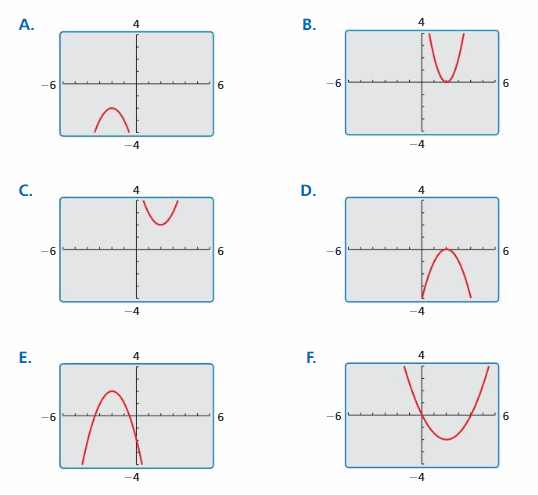
Communicate Your Answer
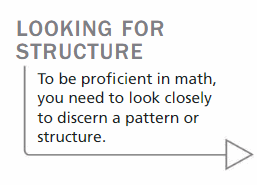
Question 2.
How do the constants a, h, and k affect the graph of the quadratic function g(x) =a(x – h)2 + k?
Question 3.
Write the equation of the quadratic function whose graph is shown at the right. Explain your reasoning. Then use a graphing calculator to verify that your equation is correct.
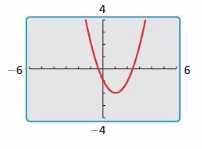
2.1 Lesson
Monitoring Progress
Describe the transformation of f(x) = x2 represented by g. Then graph each function.
Question 1.
g(x) = (x – 3)2
Question 2.
g(x) = (x + 2)2 – 2
Question 3.
g(x) = (x + 5)2 + 1
Describe the transformation of f(x) = x2 represented by g. Then graph each function.
Question 4.
g(x) = (\(\frac{1}{3} x\))2
Question 5.
g(x) = 3(x – 1)2
Question 6.
g(x) = -(x + 3)2 + 2
Question 7.
Let the graph of g be a vertical shrink by a factor of \(\frac{1}{2}\) followed by a translation 2 units up of the graph of f(x) = x2. Write a rule for g and identify the vertex.
Question 8.
Let the graph of g be a translation 4 units left followed by a horizontal shrink by a factor of \(\frac{1}{3}\) of the graph of f(x) = x2 + x. Write a rule for g.
Question 9.
WHAT IF? In Example 5, the water hits the ground 10 feet closer to the fire truck after lowering the ladder. Write a function that models the new path of the water.
Transformations of Quadratic Functions 2.1 Exercises
Vocabulary and Core Concept Check
Question 1.
COMPLETE THE SENTENCE The graph of a quadratic function is called a(n) ________.
Answer:
![]()
Question 2.
VOCABULARY Identify the vertex of the parabola given by f(x) = (x + 2)2 – 4.
Answer:
Monitoring Progress and Modeling with Mathematics
In Exercises 3–12, describe the transformation of f(x) = x2 represented by g. Then graph each function.
Question 3.
g(x) = x2 – 3
Answer:
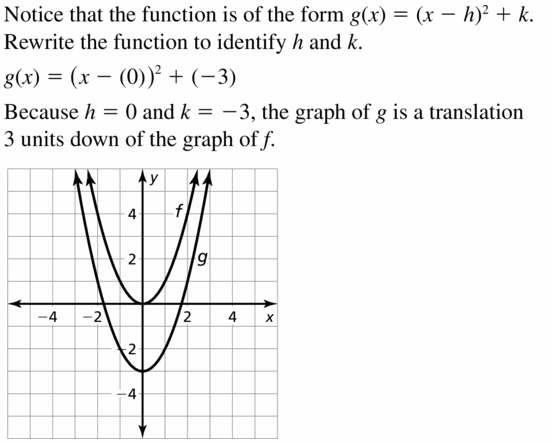
Question 4.
g(x) = x2 + 1
Answer:
Question 5.
g(x) = (x + 2)2
Answer:
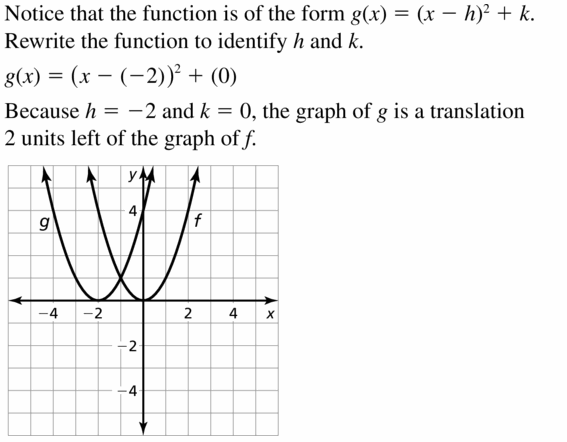
Question 6.
g(x) = (x – 4)2
Answer:
Question 7.
g(x) = (x – 1)2
Answer:
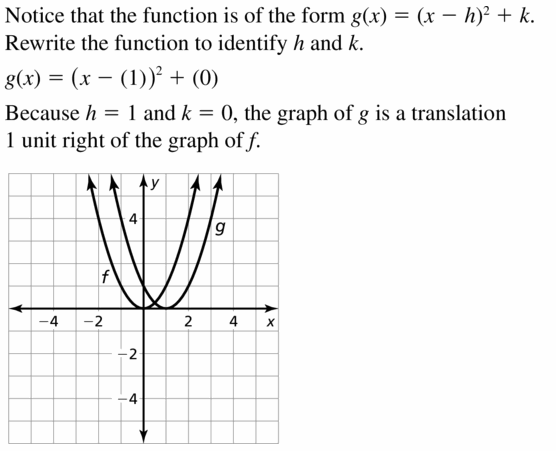
Question 8.
g(x) = (x + 3)2
Answer:
Question 9.
g(x) = (x + 6)2 – 2
Answer:
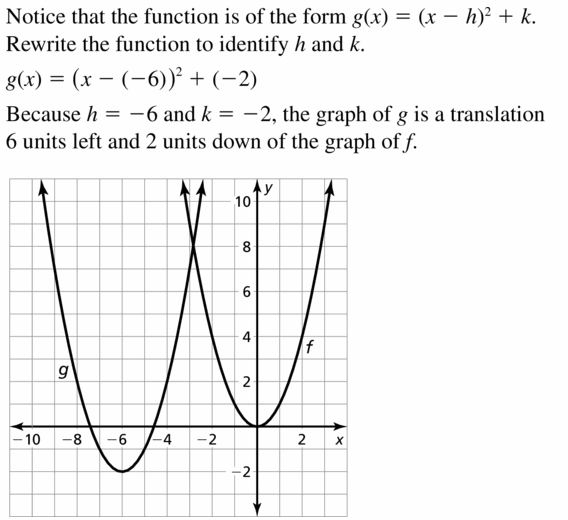
Question 10.
g(x) = (x – 9)2 + 5
Answer:
Question 11.
g(x) = (x – 7)2 + 1
Answer:
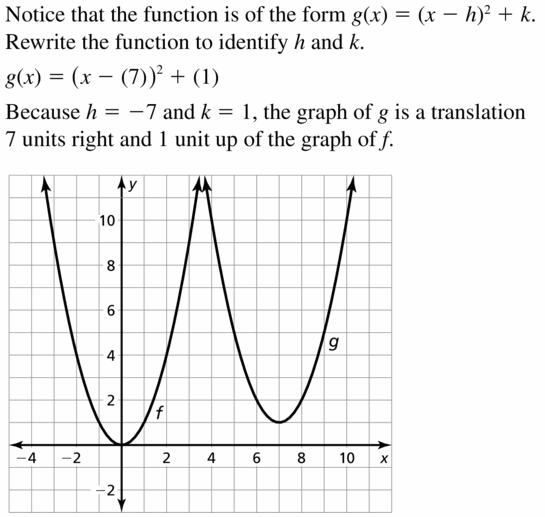
Question 12.
g(x) = (x + 10)2 – 3
Answer:
ANALYZING RELATIONSHIPS In Exercises 13–16, match the function with the correct transformation of the graph of f. Explain your reasoning.
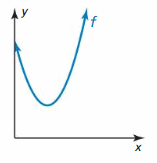
Question 13.
y = f(x – 1)
Answer:
![]()
Question 14.
y = f(x) + 1
Answer:
Question 15.
y = f(x – 1) + 1
Answer:

Question 16.
y = f(x + 1)
Answer:
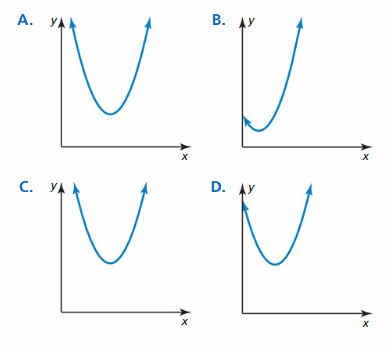
In Exercises 17–24, describe the transformation of f(x) = x2 represented by g. Then graph each function.
Question 17.
g(x) = -x2
Answer:
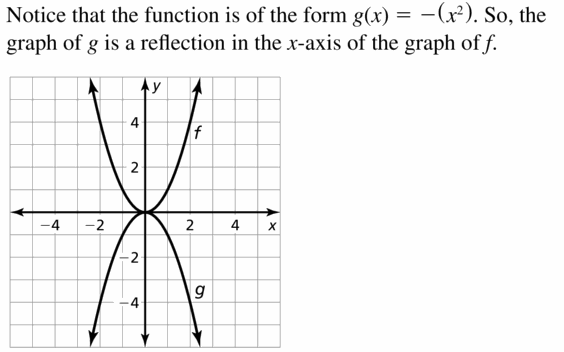
Question 18.
g(x) = (-x)2
Answer:
Question 19.
g(x) = 3x2
Answer:
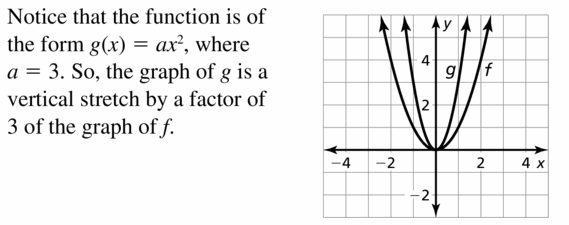
Question 20.
g(x) = \(\frac{1}{3}\)x2
Answer:
Question 21.
g(x) = (2x)2
Answer:
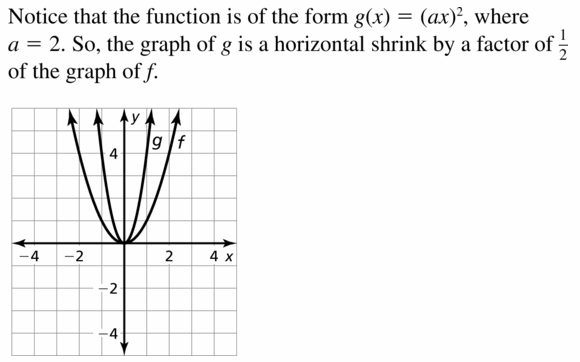
Question 22.
g(x) = -(2x)2
Answer:
Question 23.
g(x) = \(\frac{1}{5}\)x2 – 4
Answer:
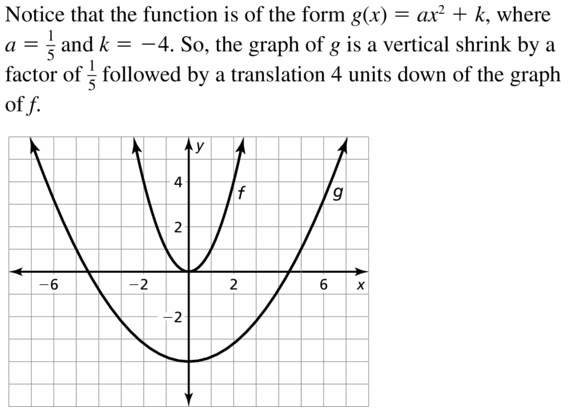
Question 24.
g(x) = \(\frac{1}{2}\)(x – 1)2
Answer:
ERROR ANALYSIS In Exercises 25 and 26, describe and correct the error in analyzing the graph of f(x) = −6x2 + 4.
Question 25.
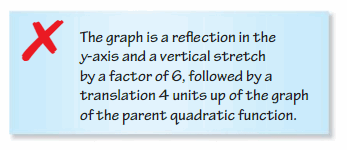
Answer:

Question 26.
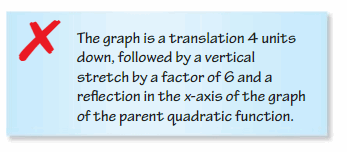
Answer:
USING STRUCTURE In Exercises 27–30, describe the transformation of the graph of the parent quadratic function. Then identify the vertex.
Question 27.
f(x) = 3(x + 2)2 + 1
Answer:

Question 28.
f(x) = -4(x + 1)2 – 5
Answer:
Question 29.
f(x) = -2x2 + 5
Answer:

Question 30.
f(x) = \(\frac{1}{2}\)(x – 1)2
Answer:
In Exercises 31–34, write a rule for g described by the transformations of the graph of f. Then identify the vertex.
Question 31.
f(x) = x2 vertical stretch by a factor of 4 and a reflection in the x-axis, followed by a translation 2 units up
Answer:
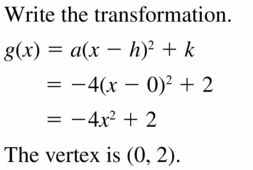
Question 32.
f(x) = x2; vertical shrink by a factor of \(\frac{1}{3}\) and a reflection in the y-axis, followed by a translation 3 units right
Answer:
Question 33.
f(x) = 8x2 – 6; horizontal stretch by a factor of 2 and a translation 2 units up, followed by a reflection in the y-axis
Answer:
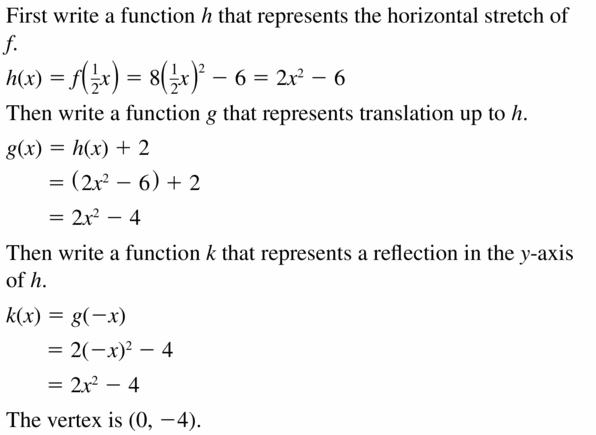
Question 34.
f(x) = (x + 6)2 + 3; horizontal shrink by a factor of \(\frac{1}{2}\) and a translation 1 unit down, followed by a reflection in the x-axis
Answer:
USING TOOLS In Exercises 35–40, match the function with its graph. Explain your reasoning.
Question 35.
g(x) = 2(x – 1)2 – 2
Answer:

Question 36.
g(x) = \(\frac{1}{2}\)(x + 1)2 – 2
Answer:
Question 37.
g(x) = -2(x – 1)2 + 2
Answer:

Question 38.
g(x) = 2(x + 1)2 + 2
Answer:
Question 39.
g(x) = -2(x + 1)2 – 2
Answer:

Question 40.
g(x) = 2(x – 1)2 + 2
Answer:
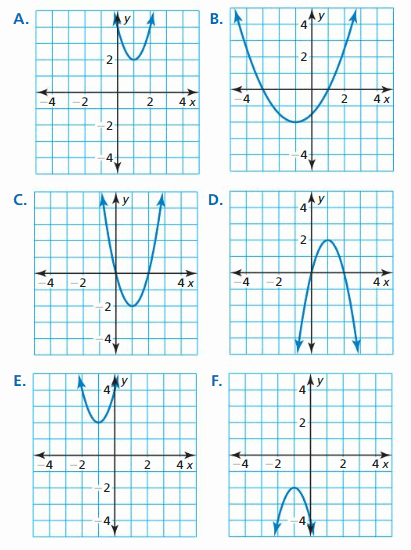
JUSTIFYING STEPS In Exercises 41 and 42, justify eachstep in writing a function g based on the transformationsof f(x) = 2x2 + 6x.
Question 41.
translation 6 units down followed by a reflection in the x-axis
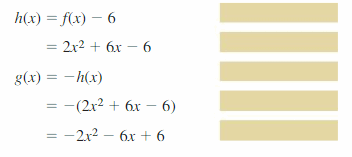
Answer:

Question 42.
reflection in the y-axis followed by a translation 4 units right
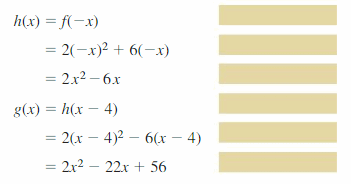
Answer:
Question 43.
MODELING WITH MATHEMATICS The function h(x) = -0.03(x – 14)2 + 6 models the jump of a red kangaroo, where x is the horizontal distance traveled (in feet) and h(x) is the height (in feet). When the kangaroo jumps from a higher location, it lands 5 feet farther away. Write a function that models the second jump.
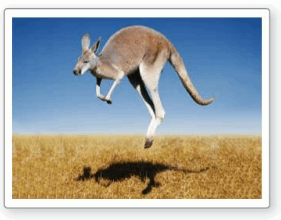
Answer:
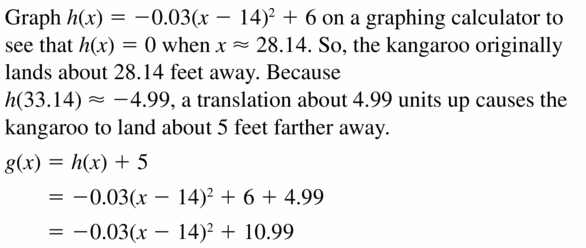
Question 44.
MODELING WITH MATHEMATICS The function f(t) = -16t2 + 10 models the height (in feet) of an object t seconds after it is dropped from a height of 10 feet on Earth. The same object dropped from the same height on the moon is modeled by g(t) = –\(\frac{8}{3}\)t2 + 10. Describe the transformation of the graph of f to obtain g. From what height must the object be dropped on the moon so it hits the ground at the same time as on Earth?
Answer:
Question 45.
MODELING WITH MATHEMATICS Flying fish use their pectoral fins like airplane wings to glide through the air.
a. Write an equation of the form y = a(x – h)2 + k with vertex (33, 5) that models the flight path, assuming the fish leaves the water at (0, 0).
b. What are the domain and range of the function? What do they represent in this situation?
c. Does the value of a change when the flight path has vertex (30, 4)? Justify your answer.

Answer:
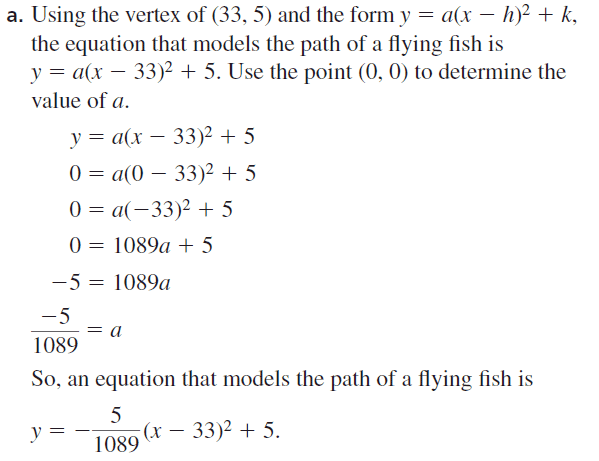
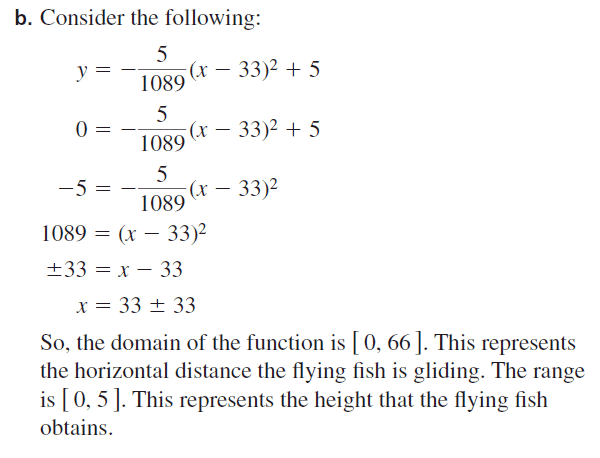
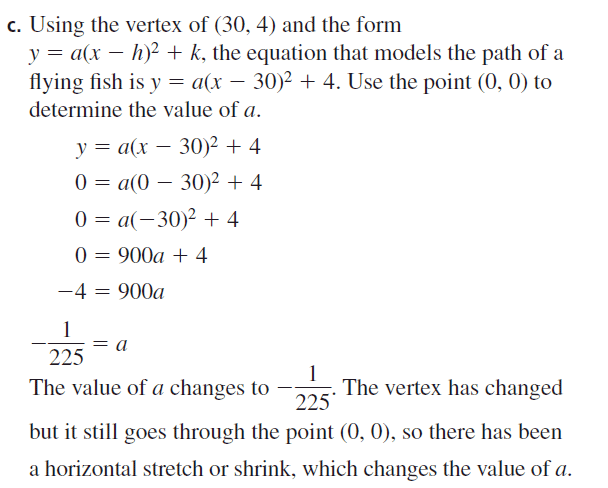
Question 46.
HOW DO YOU SEE IT? Describe the graph of g as a transformation of the graph of f(x) = x2.
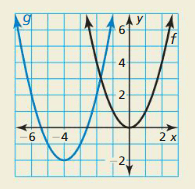
Answer:
Question 47.
COMPARING METHODS Let the graph of g be a translation 3 units up and 1 unit right followed by a vertical stretch by a factor of 2 of the graph of f(x) = x2.
a. Identify the values of a, h, and k and use vertex form to write the transformed function.
b. Use function notation to write the transformed function. Compare this function with your function in part (a).
c. Suppose the vertical stretch was performed first, followed by the translations. Repeat parts (a) and (b).
d. Which method do you prefer when writing a transformed function? Explain.
Answer:
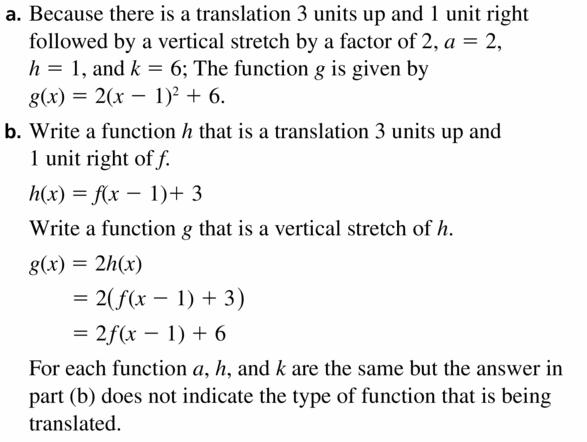
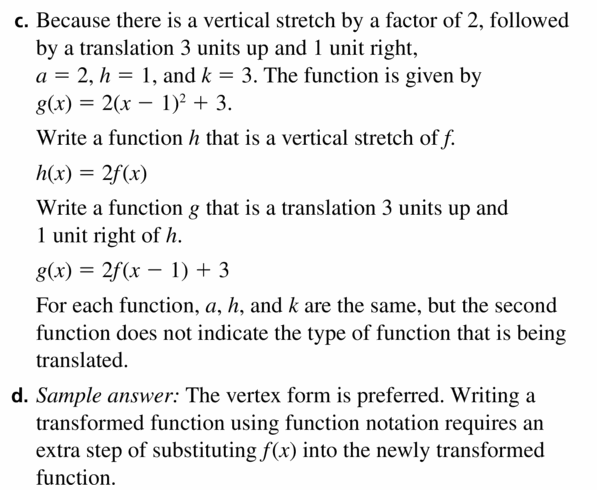
Question 48.
THOUGHT PROVOKING A jump on a pogo stick with a conventional spring can be modeled by f(x) = -0.5(x – 6)2 + 18, where x is the horizontal distance (in inches) and f(x) is the vertical distance (in inches). Write at least one transformation of the function and provide a possible reason for your transformation.
Answer:
Question 49.
MATHEMATICAL CONNECTIONS The area of a circle depends on the radius, as shown in the graph. A circular earring with a radius of r millimeters has a circular hole with a radius of \(\frac{3 r}{4}\) millimeters. Describe a transformation of the graph below that models the area of the blue portion of the earring.
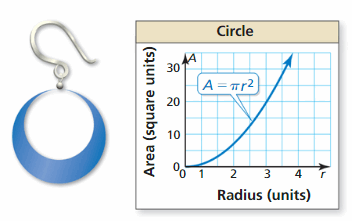
Answer:
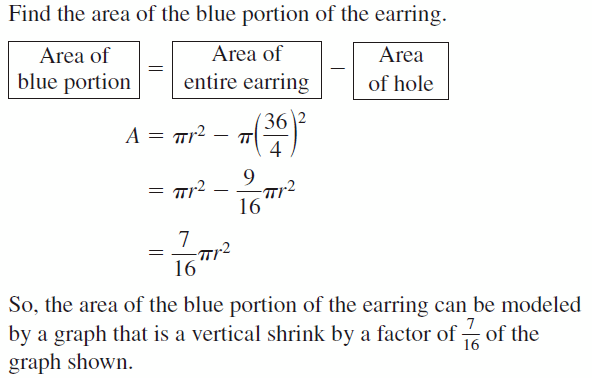
Maintaining Mathematical Proficiency
A line of symmetry for the figure is shown in red. Find the coordinates of point A. (Skills Review Handbook)
Question 50.
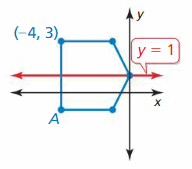
Answer:
Question 51.
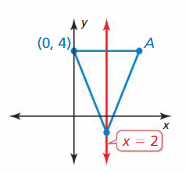
Answer:
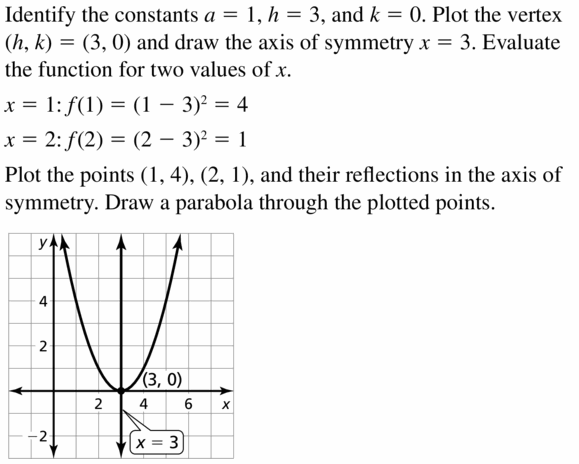
Question 52.
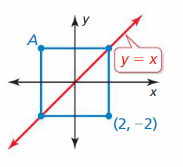
Answer:
Lesson 2.2 Characteristics of Quadratic Functions
Essential Question
What type of symmetry does the graph of f(x) = a(x – h)2 + k have and how can you describe this symmetry?
EXPLORATION 1
Parabolas and Symmetry
Work with a partner.
a. Complete the table. Then use the values in the table to sketch the graph of the function
f(x) = \(\frac{1}{2}\)x2 – 2x – 2 on graph paper.
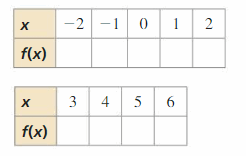
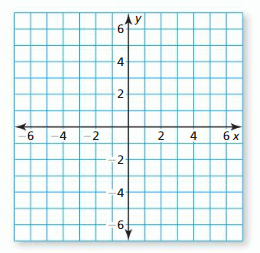
b. Use the results in part (a) to identify the vertex of the parabola.
c. Find a vertical line on your graph paper so that when you fold the paper, the left portion of the graph coincides with the right portion of the graph. What is the equation of this line? How does it relate to the vertex?
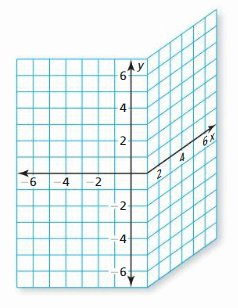
d. Show that the vertex form f(x) = \(\frac{1}{2}\)(x – 2)2 – 4 is equivalent to the function given in part (a).
EXPLORATION 2
Parabolas and Symmetry
Work with a partner. Repeat Exploration 1 for the function given by f(x) = –\(\frac{1}{3}\)x2 + 2x + 3 = –\(\frac{1}{3}\)(x – 3),sup>2 + 6.
Communicate Your Answer
Question 3.
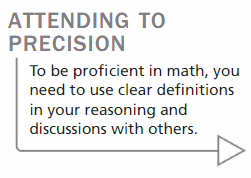
What type of symmetry does the graph of f(x) = a(x – h)2 + k have and how can you describe this symmetry?
Question 4.
Describe the symmetry of each graph. Then use a graphing calculator to verify your answer.
a. f(x) = -(x – 1)2 + 4
b. f(x) = (x + 1)2 – 2
c. f(x) = 2(x – 3)2 + 1
d. f(x) = \(\frac{1}{2}\)(x + 2)2
e. f(x) = -2x2 + 3
f. f(x) = 3(x – 5)2 + 2
2.2 Lesson
Monitoring Progress
Graph the function. Label the vertex and axis of symmetry.
Question 1.
f(x) = -3(x + 1)2
Question 2.
g(x) = 2(x – 2)2 + 5
Question 3.
h(x) = x2 + 2x – 1
Question 4.
p(x) = -2x2 – 8x + 1
Question 5.
Find the minimum value or maximum value of
(a) f(x) = 4x2 + 16x – 3 and
(b) h(x) = -x2 + 5x + 9. Describe the domain and range of each function, and where each function is increasing and decreasing.
Graph the function. Label the x-intercepts, vertex, and axis of symmetry.
Question 6.
f(x) = -(x + 1)(x + 5)
Question 7.
g(x) = \(\frac{1}{4}\)(x – 6)(x – 2)
Question 8.
WHAT IF? The graph of your third shot is a parabola through the origin that reaches a maximum height of 28 yards when x = 45. Compare the distance it travels before it hits the ground with the distances of the first two shots.
Characteristics of Quadratic Functions 2.2 Exercises
Vocabulary and Core Concept and Check
Question 1.
WRITING Explain how to determine whether a quadratic function will have a minimum value or a maximum value.
Answer:

Question 2.
WHICH ONE DOESN'T BELONG? The graph of which function does not belong with the other three? Explain.

Answer:
Question 3.
f(x) = (x – 3)2
Answer:
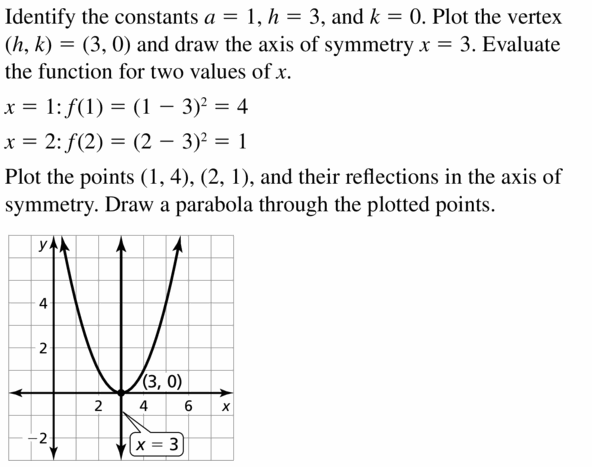
Question 4.
h(x) = (x + 4)2
Answer:
Question 5.
g(x) = (x + 3)2 + 5
Answer:
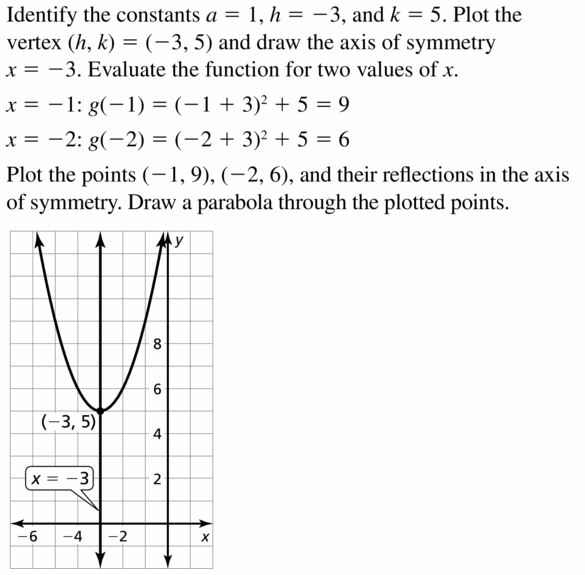
Question 6.
y = (x – 7)2 – 1
Answer:
Question 7.
y = -4(x – 2)2 + 4
Answer:
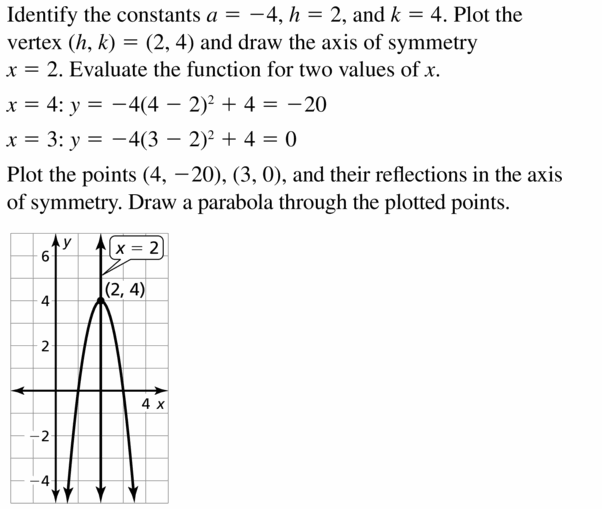
Question 8.
g(x) = 2(x + 1)2 – 3
Answer:
Question 9.
f(x) = -2(x – 1)2 – 5
Answer:
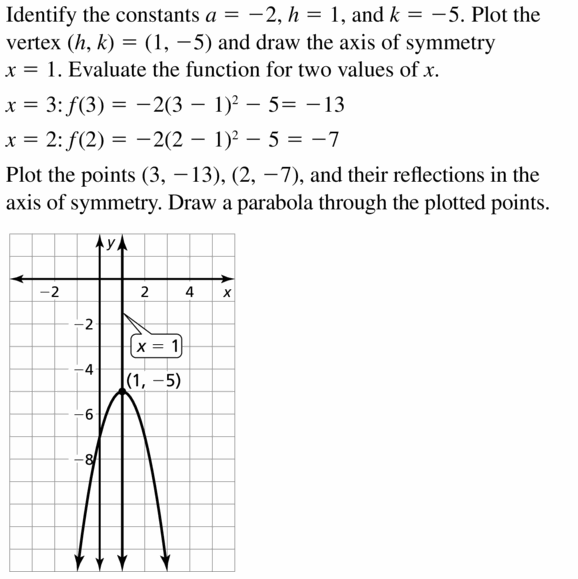
Question 10.
h(x) = 4(x + 4)2 + 6
Answer:
Question 11.
y = –\(\frac{1}{4}\)(x + 2)2 + 1
Answer:
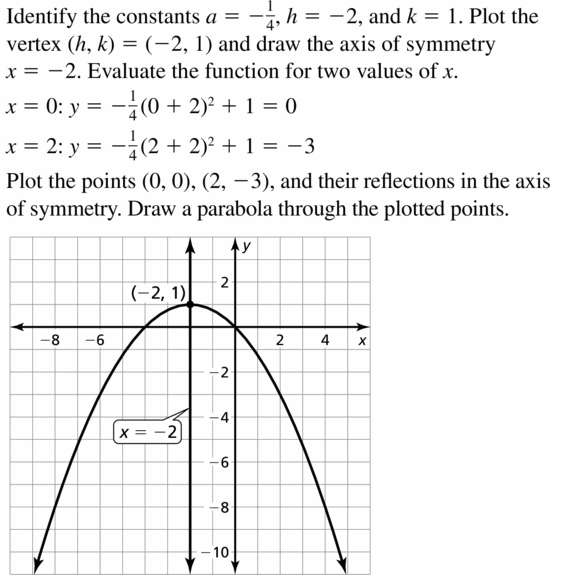
Question 12.
y = \(\frac{1}{2}\)(x – 3)2 + 2
Answer:
Question 13.
f(x) = 0.4(x – 1)2
Answer:
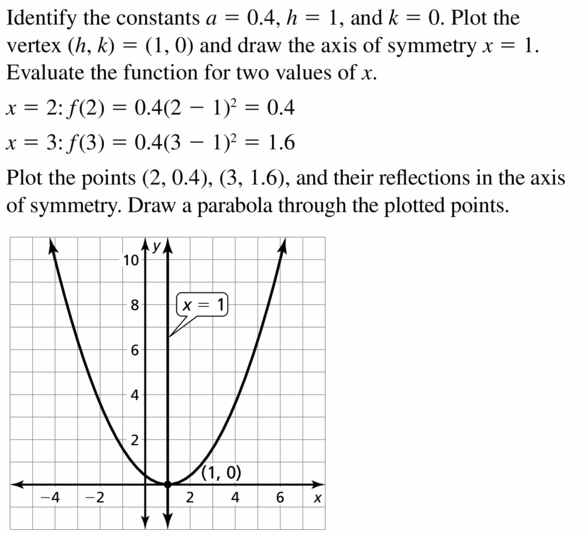
Question 14.
g(x) = 0.75x2 – 5
Answer:
ANALYZING RELATIONSHIPS In Exercises 15–18, use the axis of symmetry to match the equation with its graph.
Question 15.
y = 2(x – 3)2 + 1
Answer:
![]()
Question 16.
y = (x + 4)2 – 2
Answer:
Question 17.
y = \(\frac{1}{2}\)(x + 1)2 + 3
Answer:
![]()
Question 18.
y = (x – 2)2 – 1
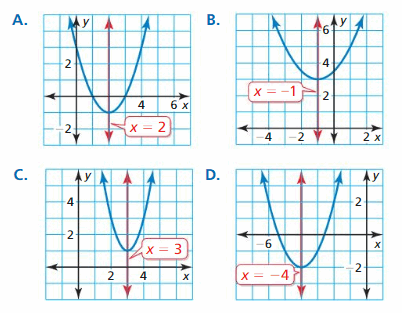
Answer:
REASONING In Exercises 19 and 20, use the axis of symmetry to plot the reflection of each point and complete the parabola.
Question 19.
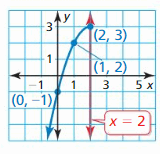
Answer:
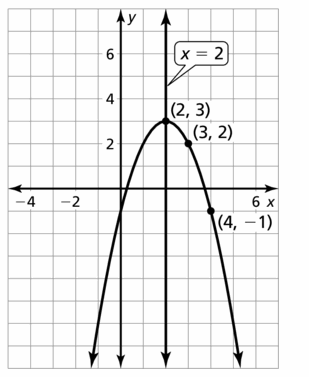
Question 20.
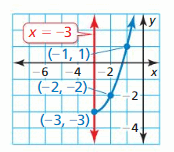
Answer:
In Exercises 21–30, graph the function. Label the vertex and axis of symmetry.
Question 21.
y = x2 + 2x + 1
Answer:
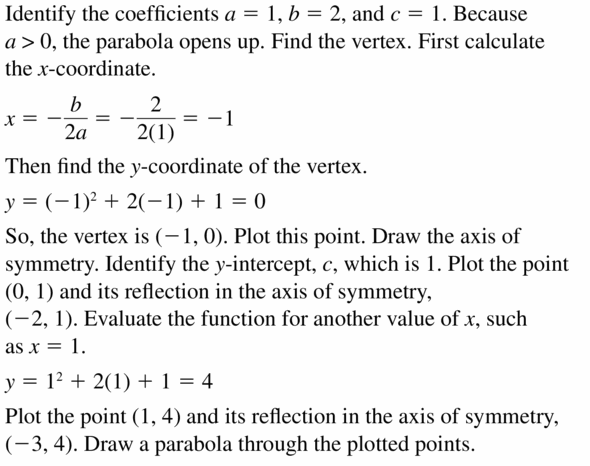
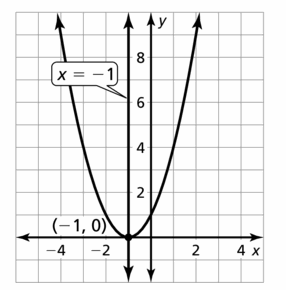
Question 22.
y = 3x2 – 6x + 4
Answer:
Question 23.
y = -4x2 + 8x + 2
Answer:
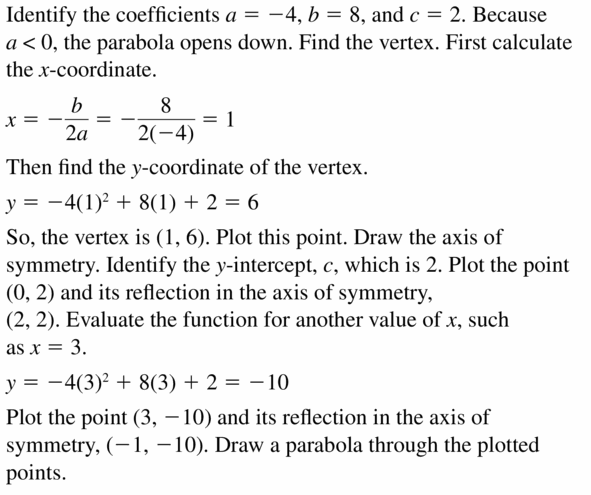
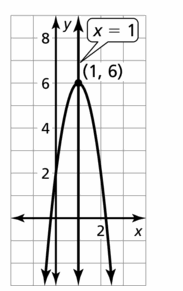
Question 24.
f(x) = -x2 – 6x + 3
Answer:
Question 25.
g(x) = -x2 – 1
Answer:
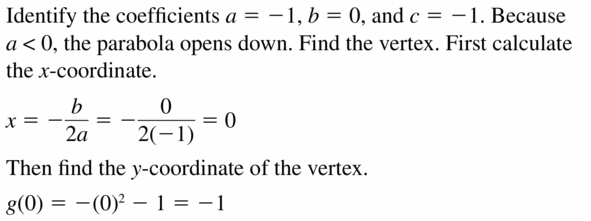
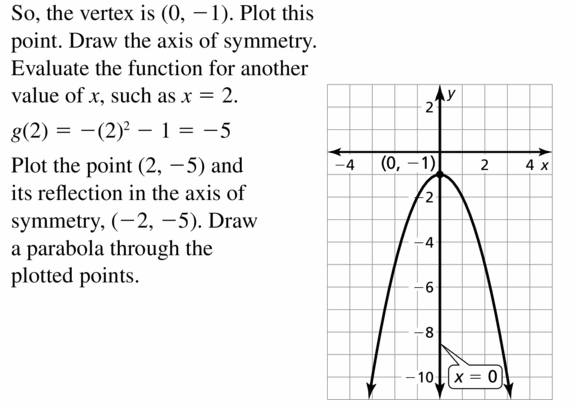
Question 26.
f(x) = 6x2 – 5
Answer:
Question 27.
g(x) = -1.5x2 + 3x + 2
Answer:
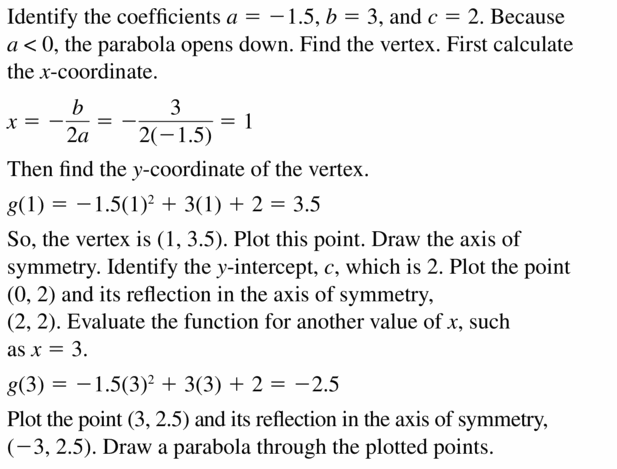
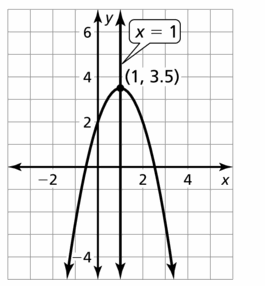
Question 28.
f(x) = 0.5x2 + x – 3
Answer:
Question 29.
y = \(\frac{3}{2}\)x2 – 3x + 6
Answer:
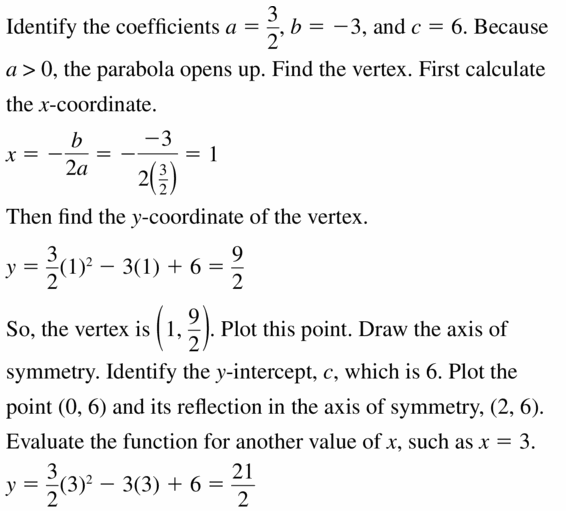
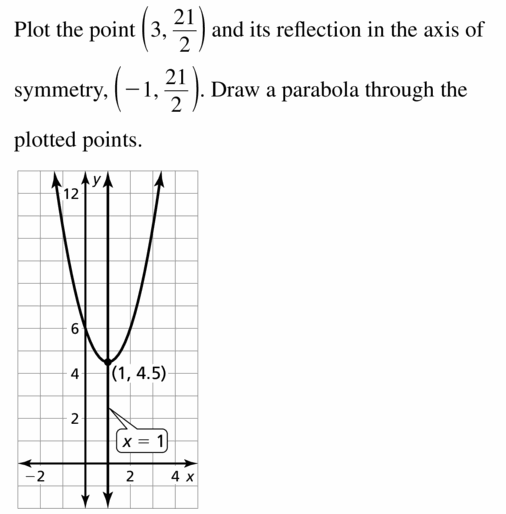
Question 30.
y = –\(\frac{5}{2}\)x2 – 4x – 1
Answer:
Question 31.
WRITING Two quadratic functions have graphs with vertices (2, 4) and (2, -3). Explain why you can not use the axes of symmetry to distinguish between the two functions.
Answer:

Question 32.
WRITING A quadratic function is increasing to the left of x = 2 and decreasing to the right of x = 2. Will the vertex be the highest or lowest point on the graph of the parabola? Explain.
Answer:
ERROR ANALYSIS In Exercises 33 and 34, describe and correct the error in analyzing the graph of y = 4x2 + 24x − 7.
Question 33.

Answer:

Question 34.

Answer:
MODELING WITH MATHEMATICS In Exercises 35 and 36, x is the horizontal distance (in feet) and y is the vertical distance (in feet). Find and interpret the coordinates of the vertex.
Question 35.
The path of a basketball thrown at an angle of 45° can be modeled by y = -0.02x2 + x + 6.
Answer:
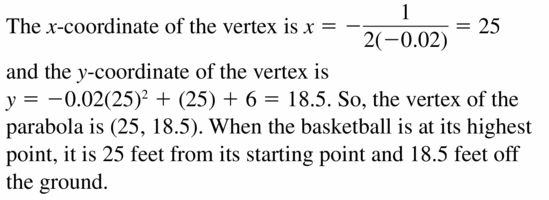
Question 36.
The path of a shot put released at an angle of 35° can be modeled by y = -0.01x2 + 0.7x + 6.
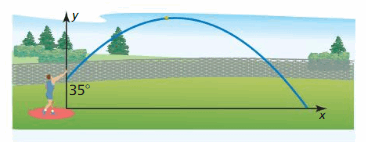
Answer:
Question 37.
ANALYZING EQUATIONS The graph of which function has the same axis of symmetry as the graph of y = x2 + 2x + 2?
A. y = 2x2 + 2x + 2
B. y = -3x2 – 6x + 2
C. y = x2 – 2x + 2
D. y = -5x2 + 10x + 23
Answer:

Question 38.
USING STRUCTURE Which function represents the widest parabola? Explain your reasoning.
A. y = 2(x + 3)2
B. y = x2 – 5
C. y = 0.5(x – 1)2 + 1
D. y = -x2 + 6
Answer:
In Exercises 39–48, find the minimum or maximum value of the function. Describe the domain and range of the function, and where the function is increasing and decreasing.
Question 39.
y = 6x2 – 1
Answer:
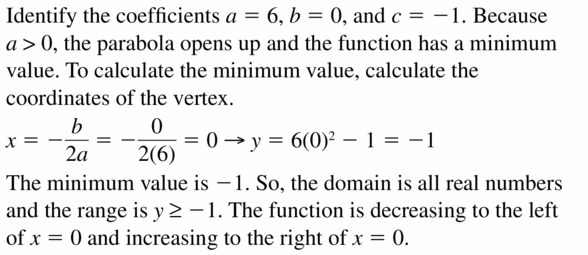
Question 40.
y = 9x2 + 7
Answer:
Question 41.
y = -x2 – 4x – 2
Answer:
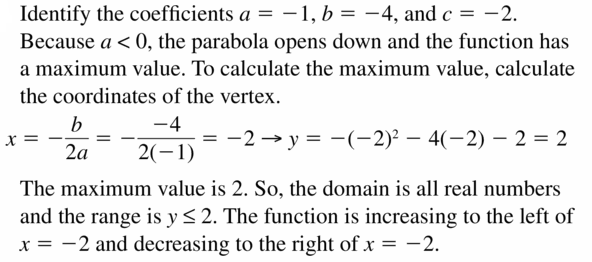
Question 42.
g(x) = -3x2 – 6x + 5
Answer:
Question 43.
f(x) = -2x2 + 8x + 7
Answer:
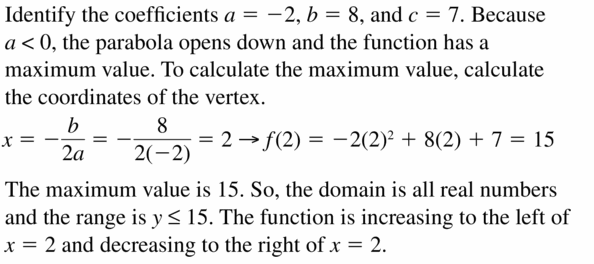
Question 44.
g(x) = 3x2 + 18x – 5
Answer:
Question 45.
h(x) = 2x2 – 12x
Answer:
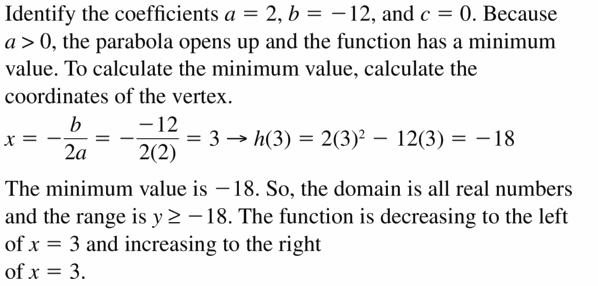
Question 46.
h(x) = x2 – 4x
Answer:
Question 47.
y = \(\frac{1}{4}\)x2 – 3x + 2
Answer:
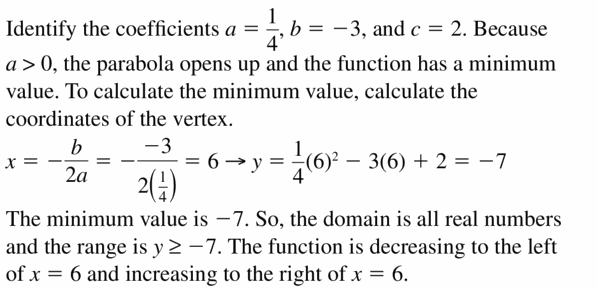
Question 48.
f(x) = \(\frac{3}{2}\)x2 + 6x + 4
Answer:
Question 49.
PROBLEM SOLVING The path of a diver is modeled by the function f(x) = -9x2 + 9x + 1, where f(x) is the height of the diver (in meters) above the water and x is the horizontal distance (in meters) from the end of the diving board.
a. What is the height of the diving board?
b. What is the maximum height of the diver?
c. Describe where the diver is ascending and where the diver is descending.

Answer:
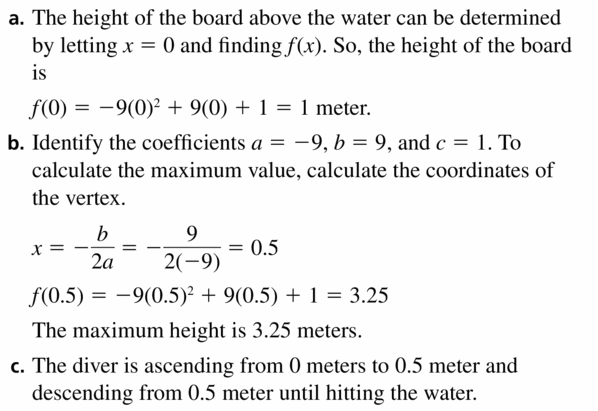
Question 50.
PROBLEM SOLVING The engine torque y (in foot-pounds) of one model of car is given by y = -3.75x2 + 23.2x + 38.8, where x is the speed (in thousands of revolutions per minute) of the engine.
a. Find the engine speed that maximizes torque. What is the maximum torque?
b. Explain what happens to the engine torque as the speed of the engine increases.
Answer:
MATHEMATICAL CONNECTIONS In Exercises 51 and 52, write an equation for the area of the figure. Then determine the maximum possible area of the figure.
Question 51.
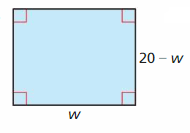
Answer:
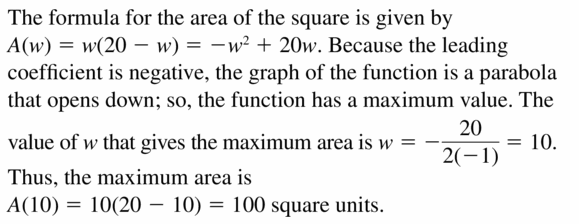
Question 52.
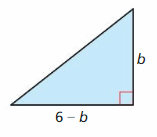
Answer:
In Exercises 53–60, graph the function. Label the x-intercept(s), vertex, and axis of symmetry.
Question 53.
y = (x + 3)(x – 3)
Answer:
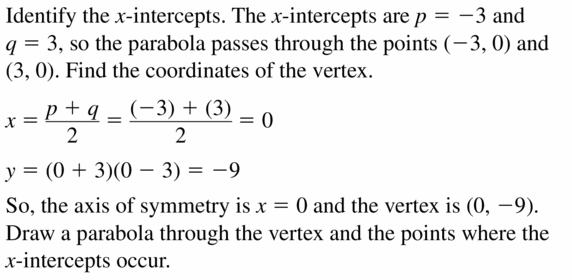
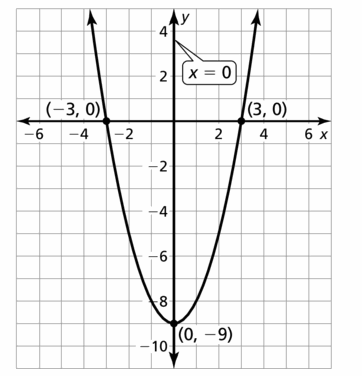
Question 54.
y = (x + 1)(x – 3)
Answer:
Question 55.
y = 3(x + 2)(x + 6)
Answer:
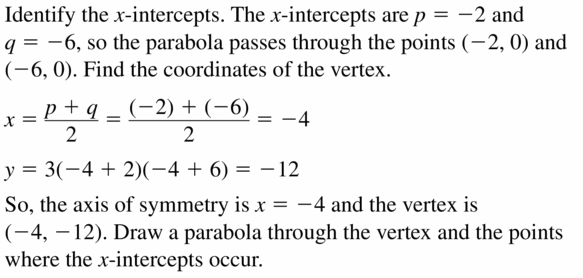
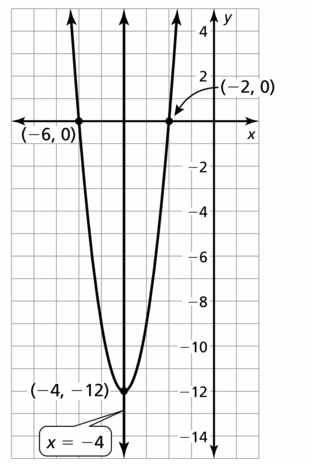
Question 56.
f(x) = 2(x – 5)(x – 1)
Answer:
Question 57.
g(x) = -x(x + 6)
Answer:
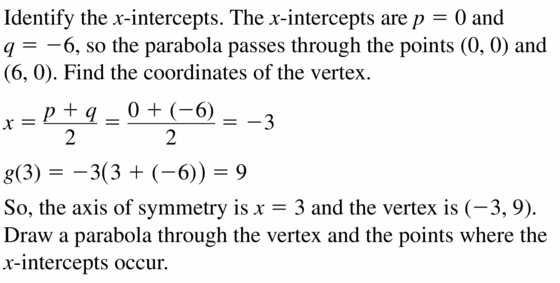
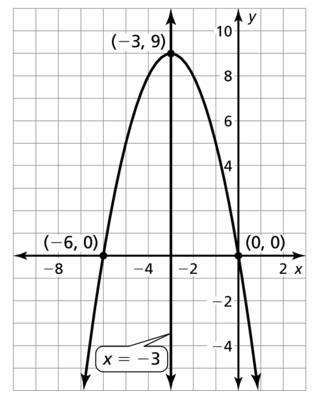
Question 58.
y = -4x(x + 7)
Answer:
Question 59.
f(x) = -2(x – 3)2
Answer:
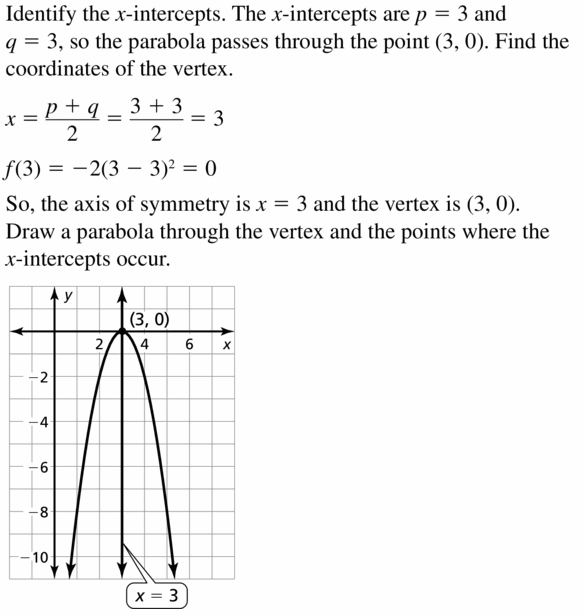
Question 60.
y = 4(x – 7)2
Answer:
USING TOOLS In Exercises 61–64, identify the x-intercepts of the function and describe where the graph is increasing and decreasing. Use a graphing calculator to verify your answer.
Question 61.
f(x) = \(\frac{1}{2}\)(x – 2)(x + 6)
Answer:
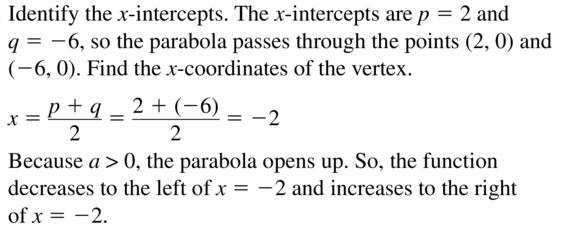
Question 62.
y = \(\frac{3}{4}\)(x + 1)(x – 3)
Answer:
Question 63.
g(x) = -4(x – 4)(x – 2)
Answer:
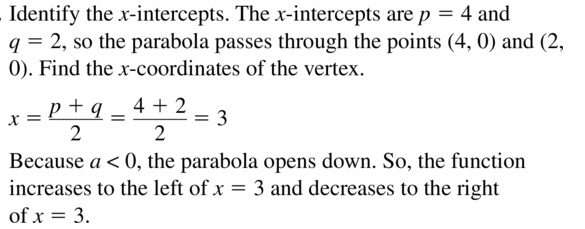
Question 64.
h(x) = -5(x + 5)(x + 1)
Answer:
Question 65.
MODELING WITH MATHEMATICS A soccer player kicks a ball downfield. The height of the ball increases until it reaches a maximum height of 8 yards, 20 yards away from the player. A second kick is modeled by y = x(0.4 – 0.008x). Which kick travels farther before hitting the ground? Which kick travels higher?

Answer:
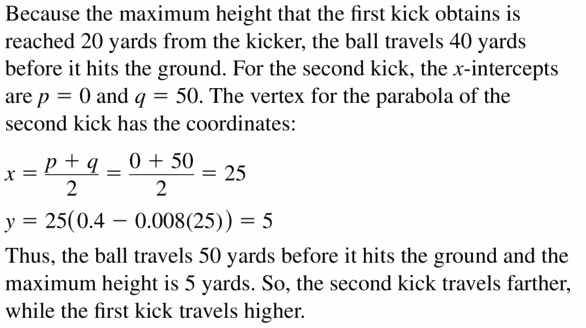
Question 66.
MODELING WITH MATHEMATICS Although a football field appears to be flat, some are actually shaped like a parabola so that rain runs off to both sides. The cross section of a field can be modeled by y = -0.000234x(x – 160), where x and y are measured in feet. What is the width of the field? What is the maximum height of the surface of the field?
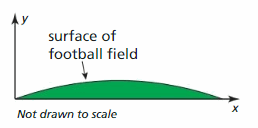
Answer:
Question 67.
REASONING The points (2, 3) and (-4, 2) lie on the graph of a quadratic function. Determine whether you can use these points to find the axis of symmetry. If not, explain. If so, write the equation of the axis of symmetry.
Answer:

Question 68.
OPEN-ENDED Write two different quadratic functions in intercept form whose graphs have the axis of symmetry x= 3.
Answer:
Question 69.
PROBLEM SOLVING An online music store sells about 4000 songs each day when it charges $1 per song. For each $0.05 increase in price, about 80 fewer songs per day are sold. Use the verbal model and quadratic function to determine how much the store should charge per song to maximize daily revenue.
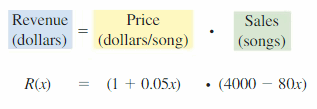
Answer:
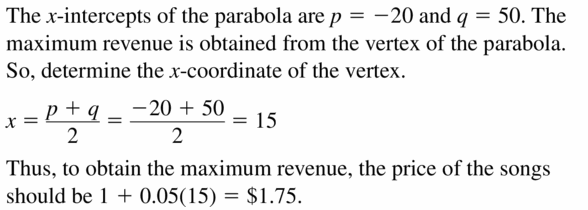
Question 70.
PROBLEM SOLVING An electronics store sells 70 digital cameras per month at a price of $320 each. For each $20 decrease in price, about 5 more cameras per month are sold. Use the verbal model and quadratic function to determine how much the store should charge per camera to maximize monthly revenue.

Answer:
Question 71.
DRAWING CONCLUSIONS Compare the graphs of the three quadratic functions. What do you notice? Rewrite the functions f and g in standard form to justify your answer.
f(x) = (x + 3)(x + 1)
g(x) = (x + 2)2 – 1
h(x) = x2 + 4x + 3
Answer:
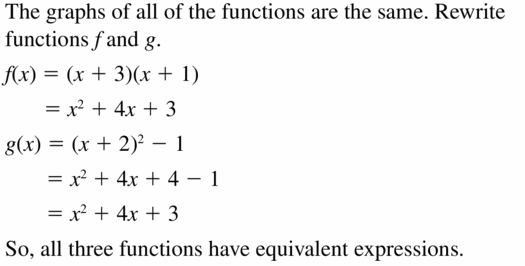
Question 72.
USING STRUCTURE Write the quadratic function f(x) = x2 + x – 12 in intercept form. Graph the function. Label the x-intercepts, y-intercept, vertex, and axis of symmetry.
Answer:
Question 73.
PROBLEM SOLVING A woodland jumping mouse hops along a parabolic path given by y = -0.2x2 + 1.3x, where x is the mouse's horizontal distance traveled (in feet) and y is the corresponding height (in feet). Can the mouse jump over a fence that is 3 feet high? Justify your answer.
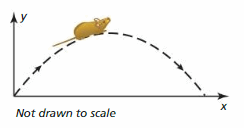
Answer:
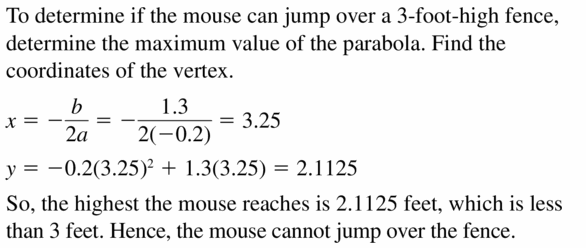
Question 74.
HOW DO YOU SEE IT? Consider the graph of the function f(x) = a(x – p)(x – q).
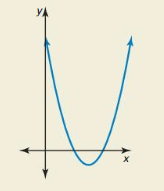
a. What does f(\(\frac{p+q}{2}\)) represent in the graph?
b. If a < 0, how does your answer in part (a) change? Explain.
Answer:
Question 75.
MODELING WITH MATHEMATICS The Gateshead Millennium Bridge spans the River Tyne. The arch of the bridge can be modeled by a parabola. The arch reaches a maximum height of 50 meters at a point roughly 63 meters across the river. Graph the curve of the arch. What are the domain and range? What do they represent in this situation?

Answer:
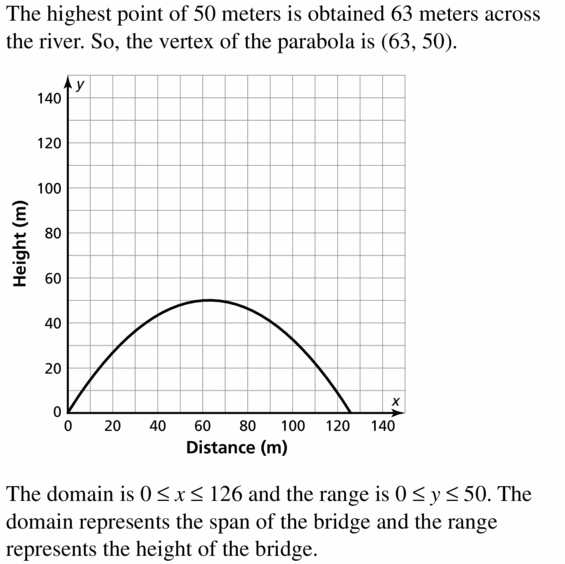
Quadratic 76.
THOUGHT PROVOKING
You have 100 feet of fencing to enclose a rectangular garden. Draw three possible designs for the garden. Of these, which has the greatest area? Make a conjecture about the dimensions of the rectangular garden with the greatest possible area. Explain your reasoning.
Answer:
Question 77.
MAKING AN ARGUMENT The point (1, 5) lies on the graph of a quadratic function with axis of symmetry x = -1. Your friend says the vertex could be the point (0, 5). Is your friend correct? Explain.
Answer:

Question 78.
CRITICAL THINKING Find the y-intercept in terms of a, p, and q for the quadratic function f(x) = a(x – p)(x – q).
Answer:
Question 79.
MODELING WITH MATHEMATICS A kernel of popcorn contains water that expands when the kernel is heated, causing it to pop. The equations below represent the "popping volume" y (in cubic centimeters per gram) of popcorn with moisture content x (as a percent of the popcorn's weight).
Hot-air popping: y = -0.761(x – 5.52)(x – 22.6)
Hot-oil popping:y = -0.652(x – 5.35)(x – 21.8)

a. For hot-air popping, what moisture content maximizes popping volume? What is the maximum volume?
b. For hot-oil popping, what moisture content maximizes popping volume? What is the maximum volume?
c. Use a graphing calculator to graph both functions in the same coordinate plane. What are the domain and range of each function in this situation? Explain.
Answer:
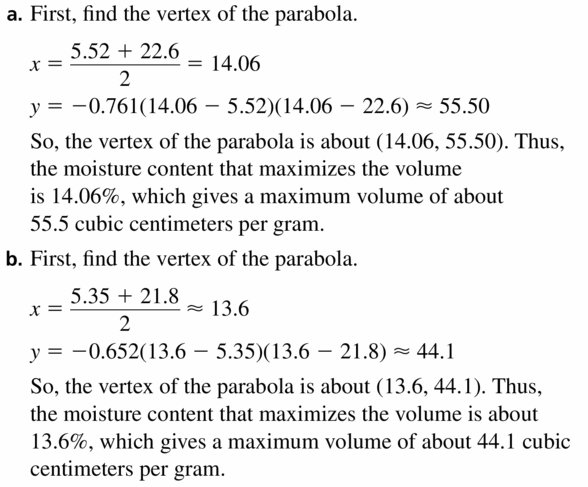
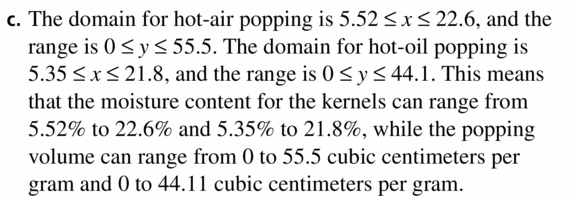
Question 80.
ABSTRACT REASONING A function is written in intercept form with a > 0. What happens to the vertex of the graph as a increases? as a approaches 0?
Answer:
Maintaining Mathematical Proficiency
Solve the equation. Check for extraneous solutions. (Skills Review Handbook)
Question 81.
3\(\sqrt{x}\) – 6 = 0
Answer:
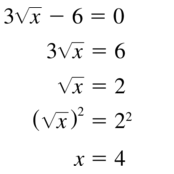
Question 82.
2\(\sqrt{x-4}\) – 2 = 2
Answer:
Question 83.
\(\sqrt{5x}\) + 5 = 0
Answer:

Question 84.
\(\sqrt{3x+8}\) = \(\sqrt{x+4}\)
Answer:
Solve the proportion. (Skills Review Handbook)
Question 85.
\(\frac{1}{2}\) = \(\frac{x}{4}\)
Answer:
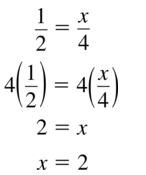
Question 86.
\(\frac{2}{3}\) = \(\frac{x}{9}\)
Answer:
Question 87.
\(\frac{-1}{4}\) = \(\frac{3}{x}\)
Answer:
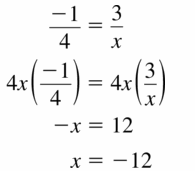
Question 88.
\(\frac{5}{2}\) =-\(\frac{20}{x}\)
Answer:
Quadratic Functions Study Skills Using the Features of Your Textbook to Prepare for Quizzes and Tests
Core Vocabulary

Core Concepts
Section 2.1

Section 2.2

Mathematical Practices
Question 1.
Why does the height you found in Exercise 44 on page 53 make sense in the context of the situation?
Question 2.
How can you effectively communicate your preference in methods to others in Exercise 47 on page 54?
Question 3.
How can you use technology to deepen your understanding of the concepts in Exercise 79 on page 64?
Study Skills
Using the Features of Your Textbook to Prepare for Quizzes and Tests
- Read and understand the core vocabulary and the contents of the Core Concept boxes.
- Review the Examples and the Monitoring Progress questions. Use the tutorials at BigIdeasMath.com for additional help.
- Review previously completed homework assignments.

Quadratic Functions 2.1 – 2.2 Quiz
2.1 – 2.2 Quiz
Describe the transformation of f(x) = x2 represented by g. (Section 2.1)
Question 1.
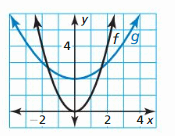
Question 2.
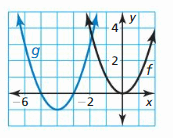
Question 3.
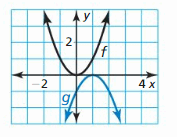
Write a rule for g and identify the vertex. (Section 2.1)
Question 4.
Let g be a translation 2 units up followed by a reflection in the x-axis and a vertical stretch by a factor of 6 of the graph of f(x) = x2.
Question 5.
Let g be a translation 1 unit left and 6 units down, followed by a vertical shrink by a factor of \(\frac{1}{2}\) of the graph of f(x) = 3(x + 2)2.
Question 6.
Let g be a horizontal shrink by a factor of \(\frac{1}{4}\), followed by a translation 1 unit up and 3 units right of the graph of f(x) = (2x + 1)2 – 11.
Graph the function. Label the vertex and axis of symmetry. (Section 2.2)
Question 7.
f(x) = 2(x – 1)2 – 5
Question 8.
h(x) = 3x2 + 6x – 2
Question 9.
f(x) = 7 – 8x – x2
Find the x-intercepts of the graph of the function. Then describe where the function is increasing and decreasing.(Section 2.2)
Question 10.
g(x) = -3(x + 2)(x + 4)
Question 11.
g(x) = \(\frac{1}{2}\)(x – 5)(x + 1)
Question 12.
f(x) = 0.4x(x – 6)
Question 13.
A grasshopper can jump incredible distances, up to 20 times its length. The height (in inches) of the jump above the ground of a 1-inch-long grasshopper is given by h(x) = –\(\frac{1}{20}\)x2 + x, where x is the horizontal distance (in inches) of the jump. When the grasshopper jumps off a rock, it lands on the ground 2 inches farther. Write a function that models the new path of the jump. (Section 2.1)
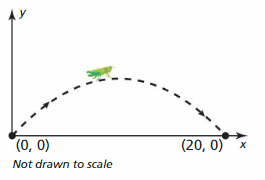
Question 14.
A passenger on a stranded lifeboat shoots a distress flare into the air. The height (in feet) of the flare above the water is given by f(t) = -16t(t – 8), where t is time (in seconds) since the flare was shot. The passenger shoots a second flare, whose path is modeled in the graph. Which flare travels higher? Which remains in the air longer? Justify your answer. (Section 2.2)
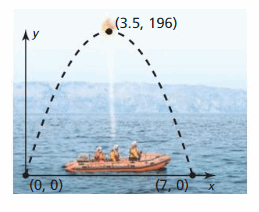
Lesson 2.3 Focus of a Parabola
Essential Question
What is the focus of a parabola?
EXPLORATION 1
Analyzing Satellite Dishes
Work with a partner. Vertical rays enter a satellite dish whose cross section is a parabola. When the rays hit the parabola, they reflect at the same angle at which they entered. (See Ray 1 in the figure.)
a. Draw the reflected rays so that they intersect the y-axis.
b. What do the reflected rays have in common?
c. The optimal location for the receiver of the satellite dish is at a point called the focus of the parabola. Determine the location of the focus. Explain why this makes sense in this situation.
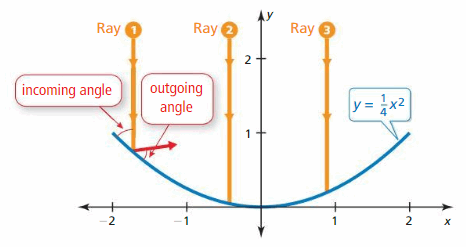
EXPLORATION 2
Analyzing Spotlights
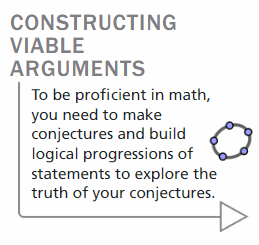
Work with a partner. Beams of light are coming from the bulb in a spotlight, located at the focus of the parabola. When the beams hit the parabola, they reflect at the same angle at which they hit. (See Beam 1 in the figure.) Draw the reflected beams. What do they have in common? Would you consider this to be the optimal result? Explain.
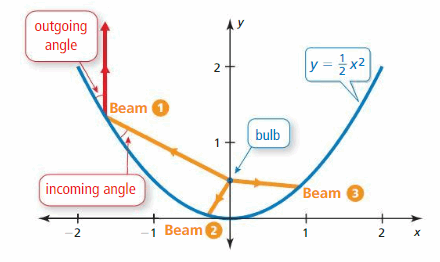
Communicate Your Answer
Question 3.
What is the focus of a parabola?
Question 4.
Describe some of the properties of the focus of a parabola.
2.3 Lesson
Monitoring Progress
Question 1.
Use the Distance Formula to write an equation of the parabola with focus F(0, -3) and directrix y = 3.
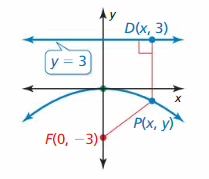
Identify the focus, directrix, and axis of symmetry of the parabola. Then graph the equation.
Question 2.
y = 0.5x2
Question 3.
-y = x2
Question 4.
y2 = 6x
Write an equation of the parabola with vertex at (0, 0) and the given directrix or focus.
Question 5.
directrix: x = -3
Question 6.
focus: (-2, 0)
Question 7.
focus: (0, \(\frac{3}{2}\))
Monitoring Progress
Question 8.
Write an equation of a parabola with vertex (-1, 4) and focus (-1, 2).
Question 9.
A parabolic microwave antenna is 16 feet in diameter. Write an equation that represents the cross section of the antenna with its vertex at (0, 0) and its focus 10 feet to the right of the vertex. What is the depth of the antenna?
Focus of a Parabola 2.3 Exercises
Vocabulary and Core Concept Check
Question 1.
COMPLETE THE SENTENCE A parabola is the set of all points in a plane equidistant from a fixed point called the ______ and a fixed line called the __________ .
Answer:

Question 2.
WRITING Explain how to find the coordinates of the focus of a parabola with vertex (0, 0)and directrix y = 5.
Answer:
Monitoring Progress and Modeling with Mathematics
In Exercises 3–10, use the Distance Formula to write an equation of the parabola.
Question 3.
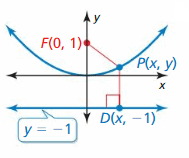
Answer:
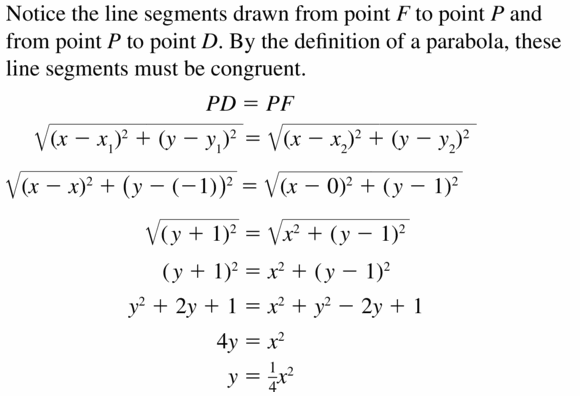
Question 4.
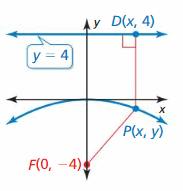
Answer:
Question 5.
focus: (0, -2)
directrix: y = 2
Answer:
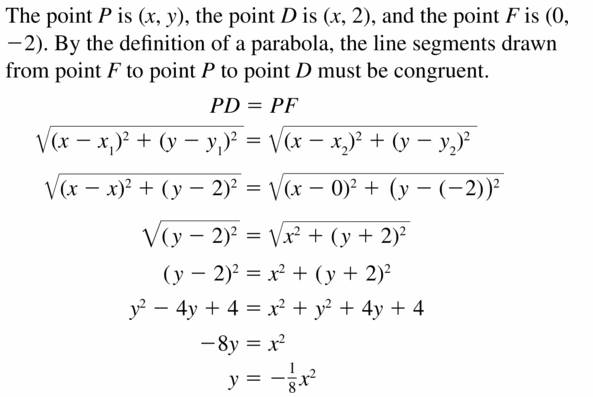
Question 6.
directrix: y = 7
focus: (0, -7)
Answer:
Question 7.
vertex: (0, 0)
directrix: y = -6
Answer:
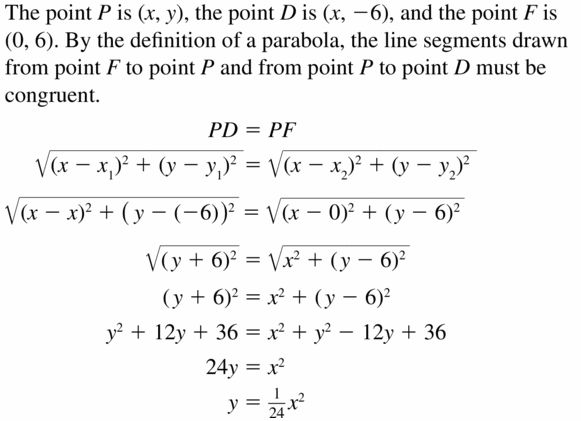
Question 8.
vertex: (0, 0)
focus: (0, 5)
Answer:
Question 9.
vertex: (0, 0)
focus: (0, -10)
Answer:
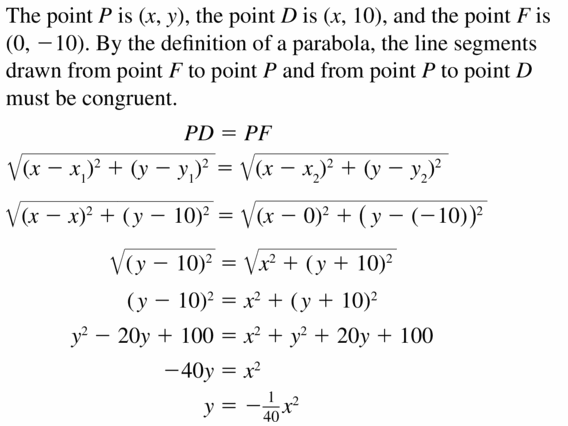
Question 10.
vertex: (0, 0)
directrix: y = -9
Answer:
Question 11.
ANALYZING RELATIONSHIPS Which of the given characteristics describe parabolas that open down? Explain your reasoning.
A. focus: (0, -6)
directrix: y = 6
B. focus: (0, -2)
directrix: y = 2
C.focus: (0, 6)
directrix: y = -6
D. focus: (0, -1)
directrix: y = 1
Answer:

Question 12.
REASONING Which of the following are possible coordinates of the point P in the graph shown? Explain.
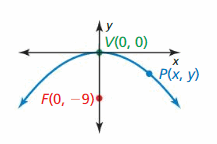
A. (-6, -1)
B. (3, –\(\frac{1}{4}\))
C. (4, –\(\frac{4}{9}\))
D. (1, –\(\frac{1}{36}\))
E. (6, -1)
F. (2, –\(\frac{1}{18}\))
Answer:
In Exercises 13–20, identify the focus, directrix, and axis of symmetry of the parabola. Graph the equation.
Question 13.
y = \(\frac{1}{8}\)x2
Answer:
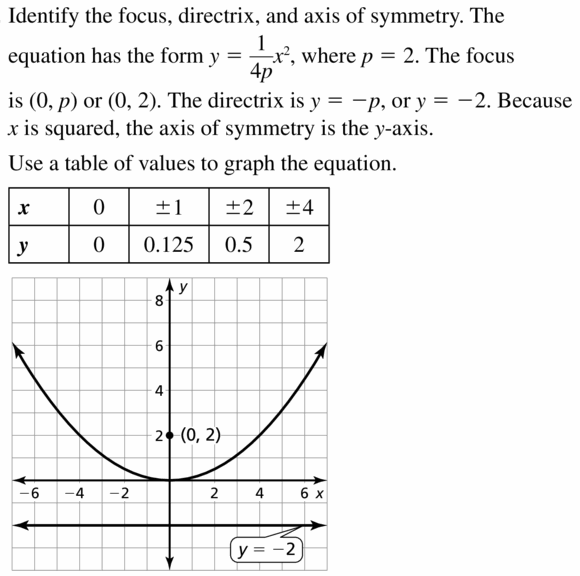
Question 14.
y = –\(\frac{1}{12}\)x2
Answer:
Question 15.
x = –\(\frac{1}{20}\)y2
Answer:
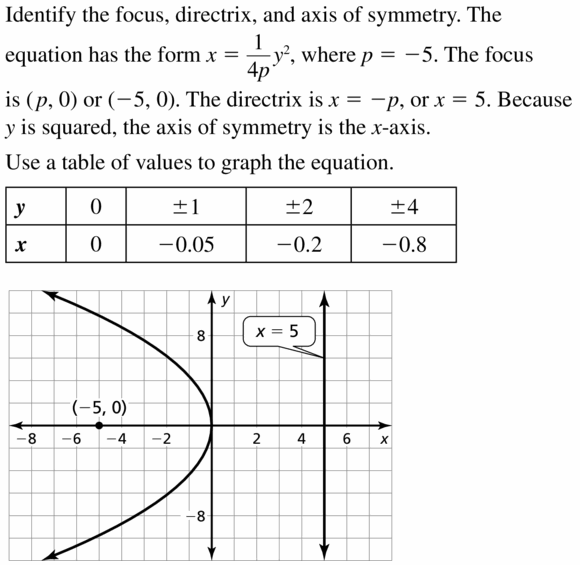
Question 16.
x= \(\frac{1}{24}\)y2
Answer:
Question 17.
y2 = 16x
Answer:
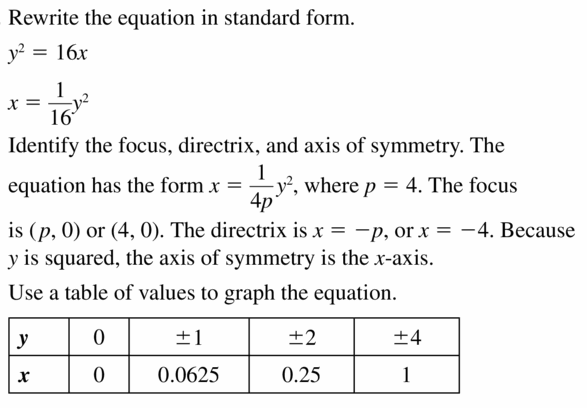
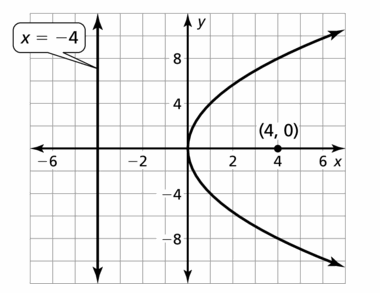
Question 18.
-x2 = 48y
Answer:
Question 19.
6x2 + 3y = 0
Answer:
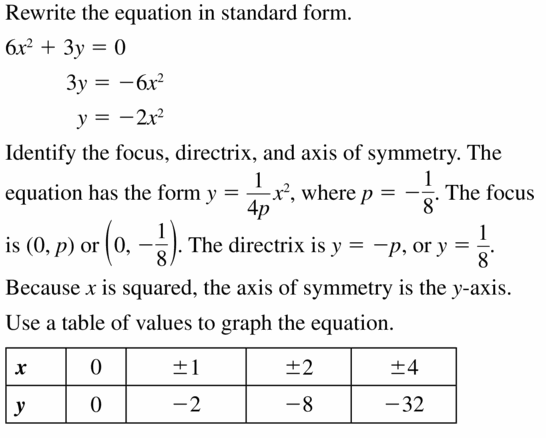
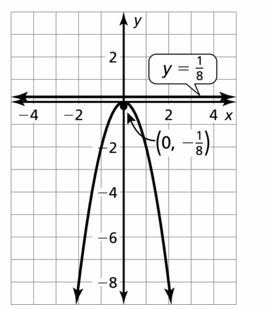
Question 20.
8x2 – y = 0
Answer:
ERROR ANALYSIS In Exercises 21 and 22, describe and correct the error in graphing the parabola.
Question 21.
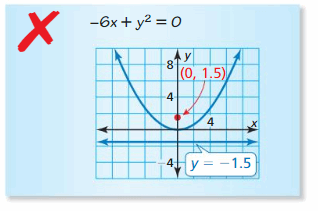
Answer:
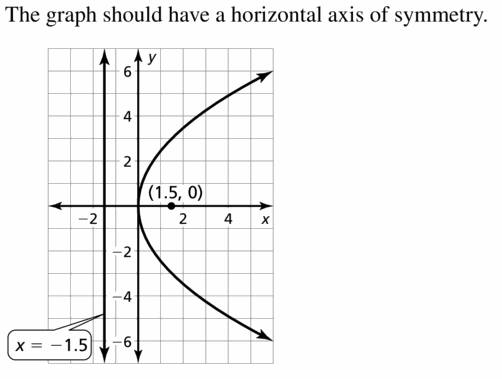
Question 22.
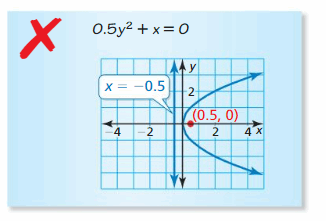
Answer:
Question 23.
ANALYZING EQUATIONS The cross section (with units in inches) of a parabolic satellite dish can be modeled by the equation y = \(\frac{1}{38}\)x2. How far is the receiver from the vertex of the cross section? Explain.
Answer:

Question 24.
ANALYZING EQUATIONS The cross section (with units in inches) of a parabolic spotlight can be modeled by the equation x = \(\frac{1}{20}\)y2. How far is the bulb from the vertex of the cross section? Explain.
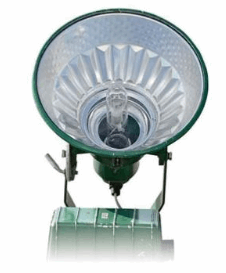
Answer:
In Exercises 25–28, write an equation of the parabola shown.
Question 25.
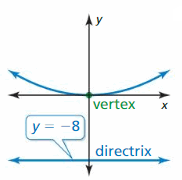
Answer:
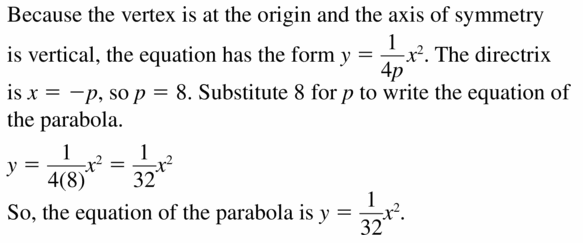
Question 26.
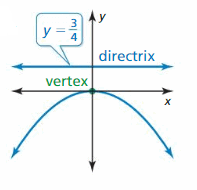
Answer:
Question 27.
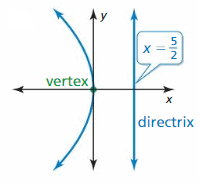
Answer:
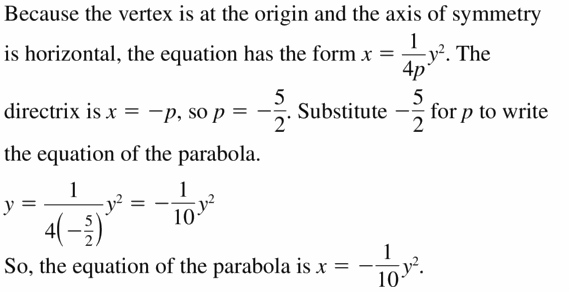
Question 28.
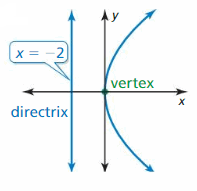
Answer:
In Exercises 29–36, write an equation of the parabola with the given characteristics.
Question 29.
focus: (3, 0)
directrix: x = -3
Answer:
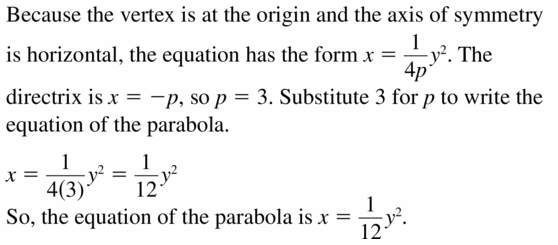
Question 30.
focus: (\(\frac{2}{3}\), 0)
directrix: x = –\(\frac{2}{3}\)
Answer:
Question 31.
directrix: x = -10
vertex: (0, 0)
Answer:
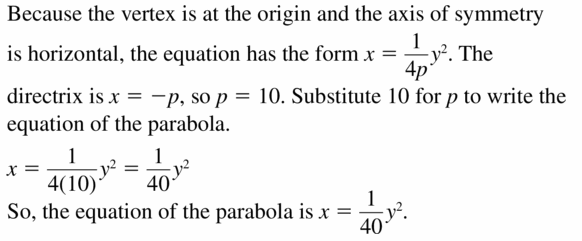
Question 32.
directrix: y = \(\frac{8}{3}\)
vertex: (0, 0)
Answer:
Question 33.
focus: (0, –\(\frac{5}{3}\))
directrix: y = \(\frac{5}{3}\)
Answer:
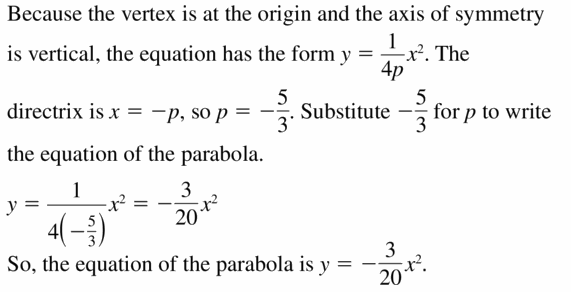
Question 34.
focus: (0, \(\frac{5}{4}\))
directrix: y = –\(\frac{5}{4}\)
Answer:
Question 35.
focus: (0, \(\frac{6}{7}\))
vertex: (0, 0)
Answer:
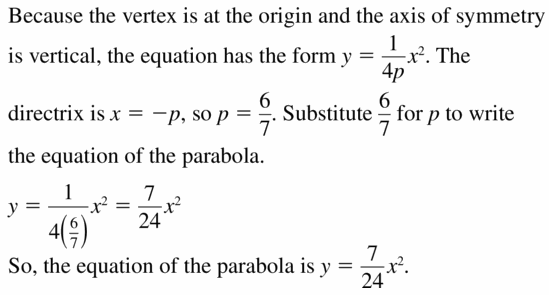
Question 36.
focus: (-\(\frac{4}{5}\), 0)
vertex: (0, 0)
Answer:
In Exercises 37–40, write an equation of the parabola shown.
Question 37.
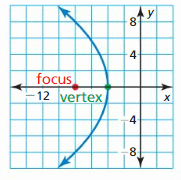
Answer:
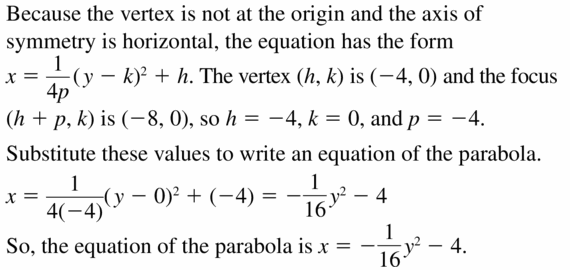
Question 38.
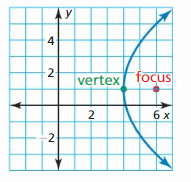
Answer:
Question 39.
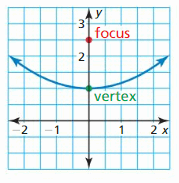
Answer:
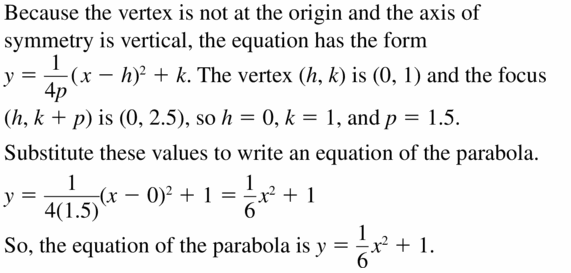
Question 40.
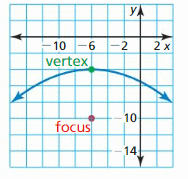
Answer:
In Exercises 41–46, identify the vertex, focus, directrix, and axis of symmetry of the parabola. Describe the transformations of the graph of the standard equation with p = 1 and vertex (0, 0).
Question 41.
y = \(\frac{1}{8}\)(x – 3)2 + 2
Answer:

Question 42.
y = –\(\frac{1}{4}\)(x + 2)2 + 1
Answer:
Question 43.
x = \(\frac{1}{16}\)(y – 3)2 + 1
Answer:

Question 44.
y = (x + 3)2 – 5
Answer:
Question 45.
x = -3(y + 4)2 + 2
Answer:

Question 46.
x = 4(y + 5)2 – 1
Answer:
Question 47.
MODELING WITH MATHEMATICS Scientists studying dolphin echolocation simulate the projection of a bottlenose dolphin's clicking sounds using computer models. The models originate the sounds at the focus of a parabolic reflector. The parabola in the graph shows the cross section of the reflector with focal length of 1.3 inches and aperture width of 8 inches. Write an equation to represent the cross section of the reflector. What is the depth of the reflector?
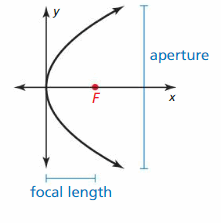
Answer:
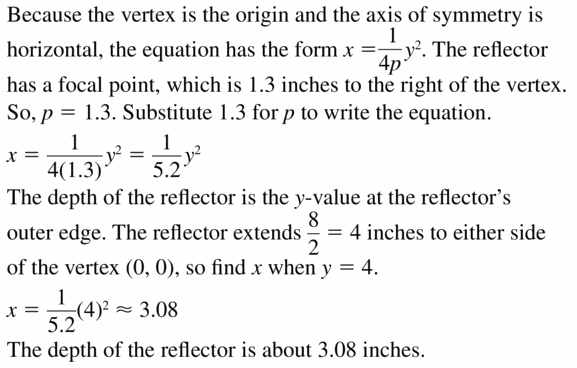
Question 48.
MODELING WITH MATHEMATICS Solar energy can be concentrated using long troughs that have a parabolic cross section as shown in the figure. Write an equation to represent the cross section of the trough. What are the domain and range in this situation? What do they represent?
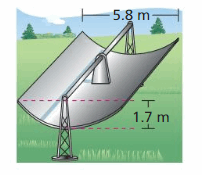
Answer:
Question 49.
ABSTRACT REASONING As | p | increases, how does the width of the graph of the equation y = \(\frac{1}{4 p}\)x2 change? Explain your reasoning.
Answer:

Question 50.
HOW DO YOU SEE IT? The graph shows the path of a volleyball served from an initial height of 6 feet as it travels over a net.
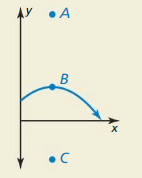
a. Label the vertex, focus, and a point on the directrix.
b. An underhand serve follows the same parabolic path but is hit from a height of 3 feet. How does this affect the focus? the directrix?
Answer:
Question 51.
CRITICAL THINKING The distance from point P to the directrix is 2 units. Write an equation of the parabola.
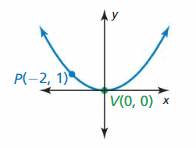
Answer:
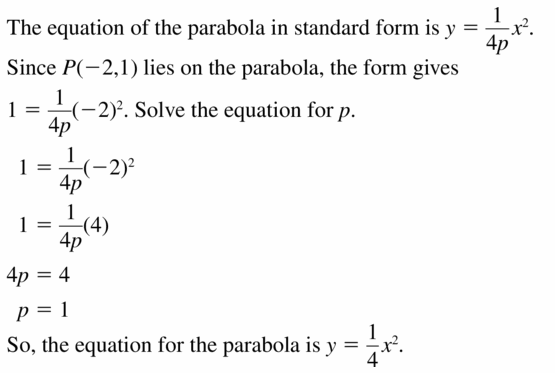
Question 52.
THOUGHT PROVOKING Two parabolas have the same focus (a, b) and focal length of 2 units. Write an equation of each parabola. Identify the directrix of each parabola.
Answer:
Question 53.
REPEATED REASONING Use the Distance Formula to derive the equation of a parabola that opens to the right with vertex (0, 0), focus (p, 0), and directrix x = -p.
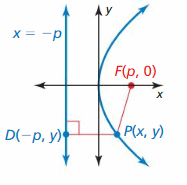
Answer:
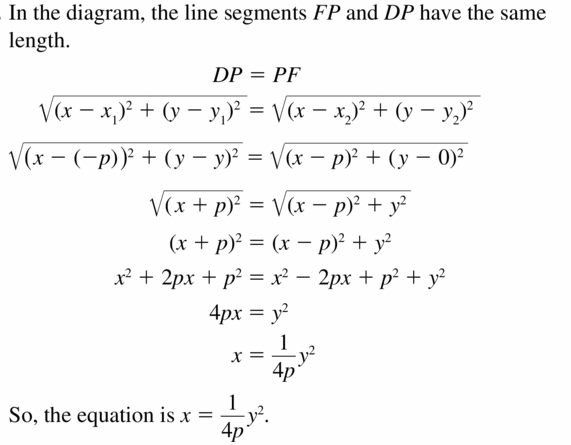
Question 54.
PROBLEM SOLVING The latus rectum of a parabola is the line segment that is parallel to the directrix, passes through the focus, and has endpoints that lie on the parabola. Find the length of the latus rectum of the parabola shown.
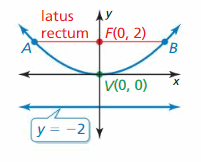
Answer:
Maintaining Mathematical Proficiency
Write an equation of the line that passes through the points.(Section 1.3)
Question 55.
(1, -4), (2, -1)
Answer:
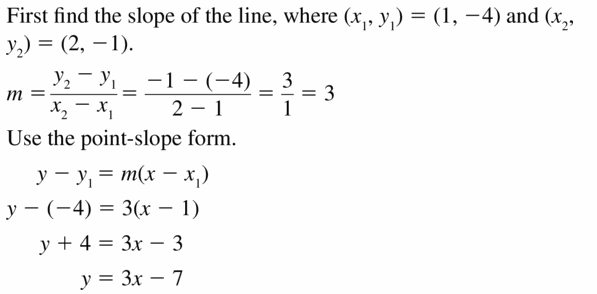
Question 56.
(-3, 12), (0, 6)
Answer:
Question 57.
(3, 1), (-5, 5)
Answer:
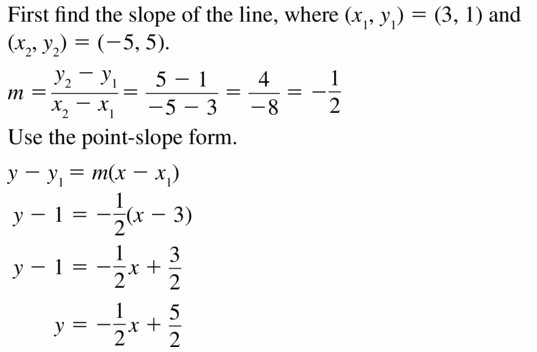
Question 58.
(2, -1), (0, 1)
Answer:
Use a graphing calculator to find an equation for the line of best fit.
Question 59.

Answer:
![]()
Question 60.

Answer:
Lesson 2.4 Modeling with Quadratic Functions
Essential Question
How can you use a quadratic function to model a real-life situation?
EXPLORATION 1
Modeling with a Quadratic Function
Work with a partner. The graph shows a quadratic function of the form
P(t) = at2 + bt + c
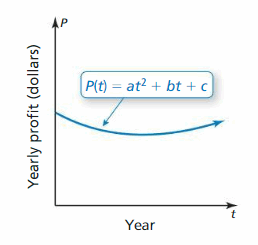
which approximates the yearly profits for a company, where P(t) is the profit in year t.
a. Is the value of a positive, negative, or zero? Explain.
b. Write an expression in terms of a and b that represents the year t when the company made the least profit.
c. The company made the same yearly profits in 2004 and 2012. Estimate the year in which the company made the least profit.
d. Assume that the model is still valid today. Are the yearly profits currently increasing, decreasing, or constant? Explain.
EXPLORATION 2
Modeling with a Graphing Calculator
Work with a partner. The table shows the heights h (in feet) of a wrench t seconds after it has been dropped from a building under construction.

a. Use a graphing calculator to create a scatter plot of the data, as shown at the right. Explain why the data appear to fit a quadratic model.
b. Use the quadratic regression feature to find a quadratic model for the data.
c. Graph the quadratic function on the same screen as the scatter plot to verify that it fits the data.
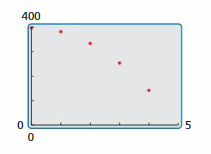
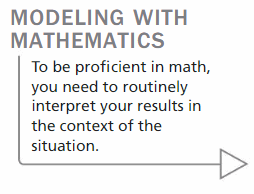
d. When does the wrench hit the ground? Explain.
Communicate Your Answer
Question 3.
How can you use a quadratic function to model a real-life situation?
Question 4.
Use the Internet or some other reference to find examples of real-life situations that can be modeled by quadratic functions.
2.4 Lesson
Monitoring Progress
Question 1.
WHAT IF? The vertex of the parabola is (50, 37.5). What is the height of the net?
Question 2.
Write an equation of the parabola that passes through the point (-1, 2) and has vertex (4, -9).
Question 3.
WHAT IF? The y-intercept is 4.8. How does this change your answers in parts (a) and (b)?
Question 4.
Write an equation of the parabola that passes through the point (2, 5) and has x-intercepts -2 and 4.
Question 5.
Write an equation of the parabola that passes through the points (-1, 4), (0, 1), and (2, 7).
Question 6.
The table shows the estimated profits y (in dollars) for a concert when the charge is x dollars per ticket. Write and evaluate a function to determine what the charge per ticket should be to maximize the profit.

Question 7.
The table shows the results of an experiment testing the maximum weights y (in tons) supported by ice x inches thick. Write a function that models the data. How much weight can be supported by ice that is 22 inches thick?

Modeling with Quadratic Functions 2.4 Exercises
Vocabulary and Core Concept Check
Question 1.
WRITING Explain when it is appropriate to use a quadratic model for a set of data.
Answer:

Question 2.
DIFFERENT WORDS, SAME QUESTION
Which is different? Find "both" answers.

Answer:
Monitoring Progress and Modeling with Mathematics
In Exercises 3–8, write an equation of the parabola in vertex form.
Question 3.
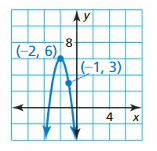
Answer:

Question 4.
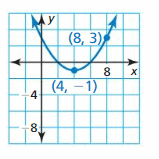
Answer:
Question 5.
passes through (13, 8) and has vertex (3, 2)
Answer:
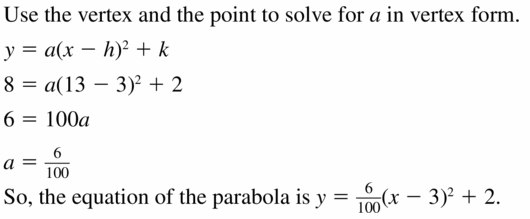
Question 6.
passes through (-7, -15) and has vertex (-5, 9)
Answer:
Question 7.
passes through (0, -24) and has vertex (-6, -12)
Answer:
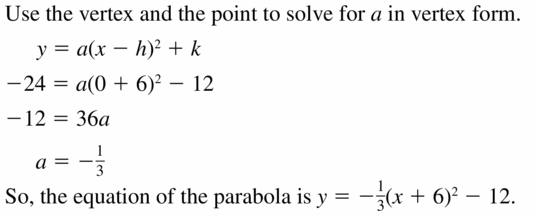
Question 8.
passes through (6, 35) and has vertex (-1, 14)
Answer:
In Exercises 9–14, write an equation of the parabola in intercept form.
Question 9.
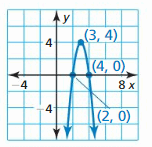
Answer:
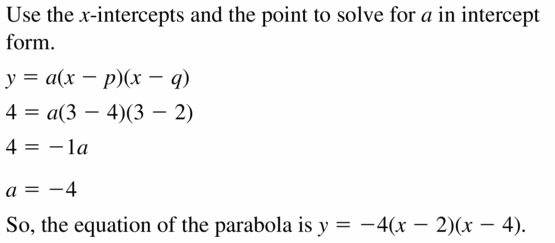
Question 10.
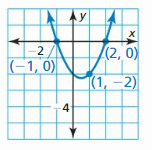
Answer:
Question 11.
x-intercepts of 12 and -6; passes through (14, 4)
Answer:
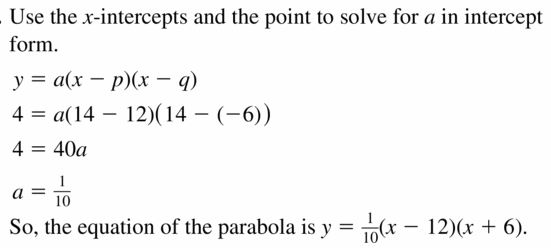
Question 12.
x-intercepts of 9 and 1; passes through (0, -18)
Answer:
Question 13.
x-intercepts of -16 and -2; passes through (-18, 72)
Answer:
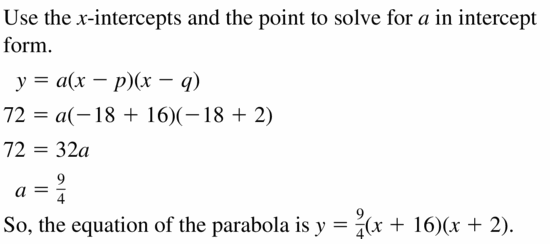
Question 14.
x-intercepts of -7 and -3; passes through (-2, 0.05)
Answer:
Question 15.
WRITING Explain when to use intercept form and when to use vertex form when writing an equation of a parabola.
Answer:

Question 16.
ANALYZING EQUATIONS Which of the following equations represent the parabola?
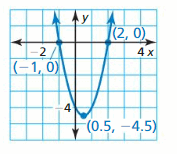
A. y = 2(x – 2)(x + 1)
B. y = 2(x + 0.5)2 – 4.5
C. y = 2(x – 0.5)2 – 4.5
D. y = 2(x + 2)(x – 1)
Answer:
In Exercises 17–20, write an equation of the parabola in vertex form or intercept form.
Question 17.
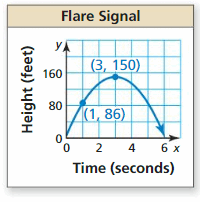
Answer:
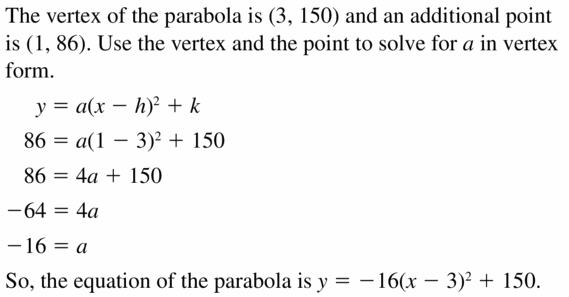
Question 18.
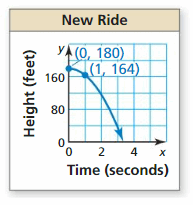
Answer:
Question 19.
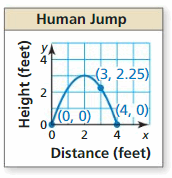
Answer:
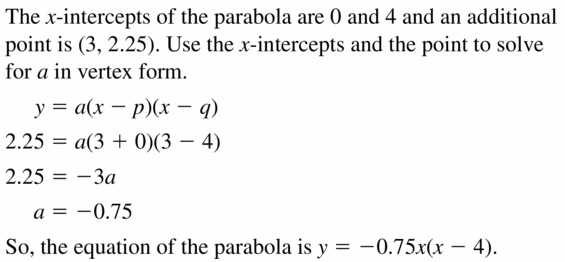
Question 20.
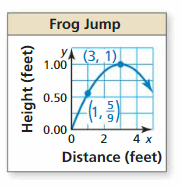
Answer:
Question 21.
ERROR ANALYSIS Describe and correct the error in writing an equation of the parabola.
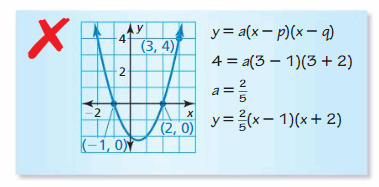
Answer:
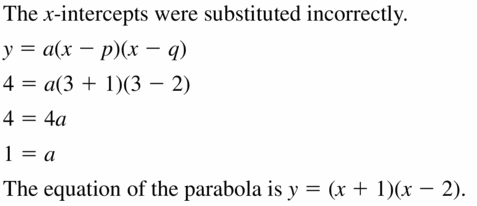
Question 22.
MATHEMATICAL CONNECTIONS The area of a rectangle is modeled by the graph where y is the area (in square meters) and x is the width (in meters). Write an equation of the parabola. Find the dimensions and corresponding area of one possible rectangle. What dimensions result in the maximum area?
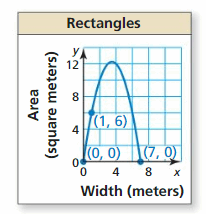
Answer:
Question 23.
MODELING WITH MATHEMATICS Every rope has a safe working load. A rope should not be used to lift a weight greater than its safe working load. The table shows the safe working loads S (in pounds) for ropes with circumference C (in inches). Write an equation for the safe working load for a rope. Find the safe working load for a rope that has a circumference of 10 inches.

Answer:
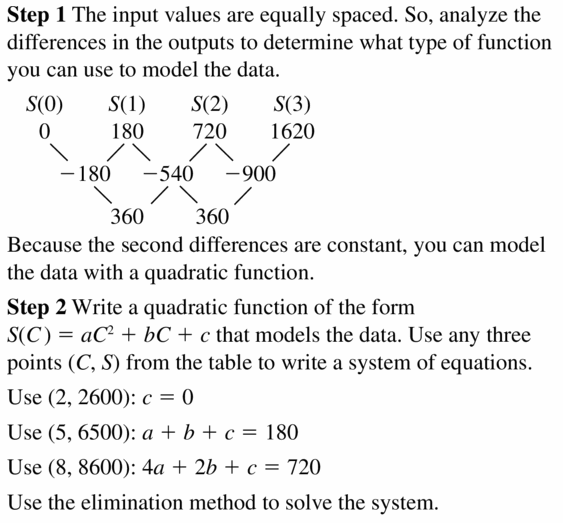
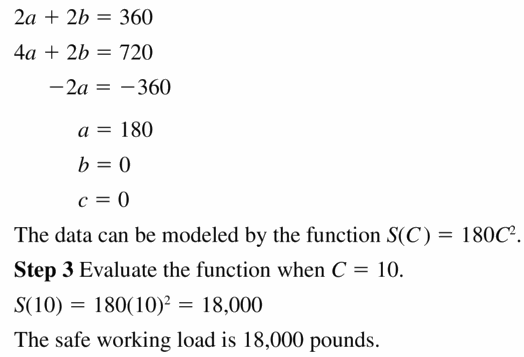
Question 24.
MODELING WITH MATHEMATICS A baseball is thrown up in the air. The table shows the heights y (in feet) of the baseball after x seconds. Write an equation for the path of the baseball. Find the height of the baseball after 1.7 seconds.

Answer:
Question 25.
COMPARING METHODS You use a system with three variables to find the equation of a parabola that passes through the points (−8, 0), (2, −20), and (1, 0). Your friend uses intercept form to find the equation. Whose method is easier? Justify your answer.
Answer:

Question 26.
MODELING WITH MATHEMATICS The table shows the distances y a motorcyclist is from home after x hours.

a. Determine what type of function you can use to model the data. Explain your reasoning.
b. Write and evaluate a function to determine the distance the motorcyclist is from home after 6 hours.
Answer:
Question 27.
USING TOOLS The table shows the heights h (in feet) of a sponge t seconds after it was dropped by a window cleaner on top of a skyscraper.

a. Use a graphing calculator to create a scatter plot. Which better represents the data, a line or a parabola? Explain.
b. Use the regression feature of your calculator to find the model that best fits the data.
c. Use the model in part (b) to predict when the sponge will hit the ground.
d. Identify and interpret the domain and range in this situation.
Answer:
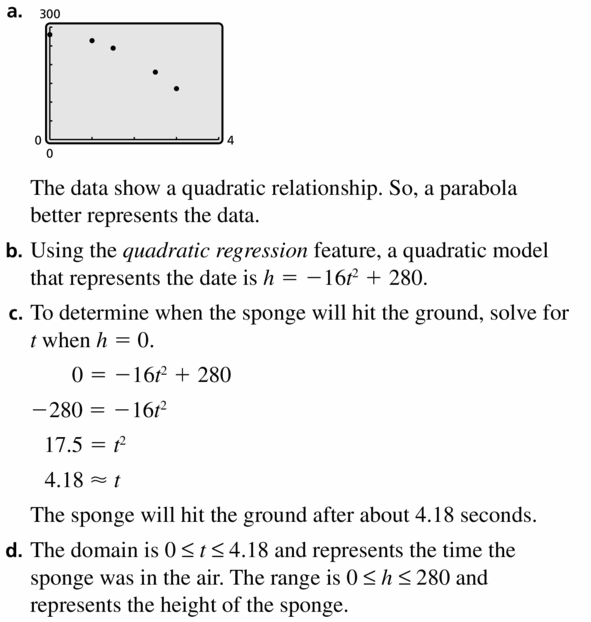
Question 28.
MAKING AN ARGUMENT Your friend states that quadratic functions with the same x-intercepts have the same equations, vertex, and axis of symmetry. Is your friend correct? Explain your reasoning.
Answer:
In Exercises 29–32, analyze the differences in the outputs to determine whether the data are linear, quadratic, or neither. Explain. If linear or quadratic, write an equation that fits the data.
Question 29.

Answer:
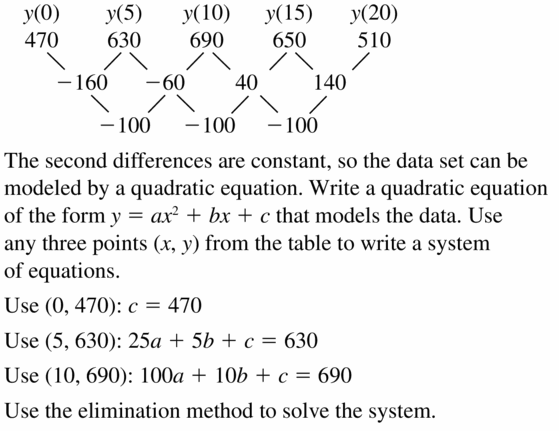
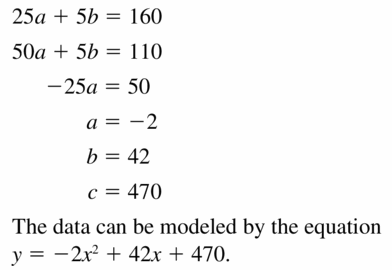
Question 30.

Answer:
Question 31.

Answer:
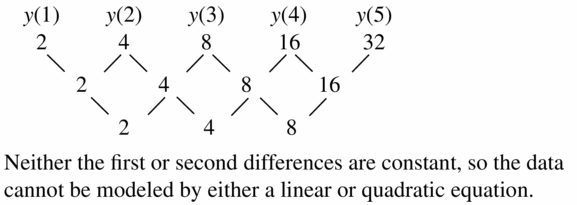
Question 32.

Answer:
Question 33.
PROBLEM SOLVING The graph shows the number y of students absent from school due to the flu each day x.
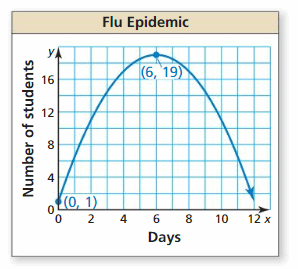
a. Interpret the meaning of the vertex in this situation.
b. Write an equation for the parabola to predict the number of students absent on day 10.
c. Compare the average rates of change in the students with the flu from 0 to 6 days and 6 to 11 days.
Answer:
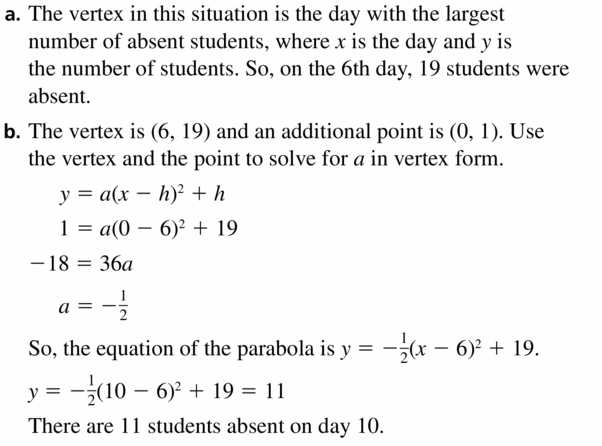
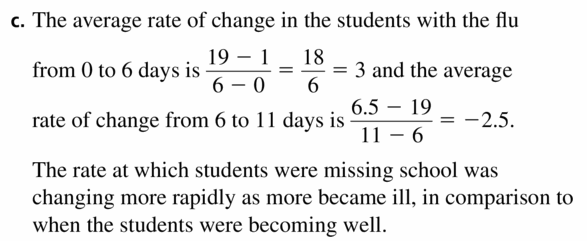
Question 34.
THOUGHT PROVOKING Describe a real-life situation that can be modeled by a quadratic equation. Justify your answer.
Answer:
Question 35.
PROBLEM SOLVING The table shows the heights y of a competitive water-skier x seconds after jumping off a ramp. Write a function that models the height of the water-skier over time. When is the water-skier 5 feet above the water? How long is the skier in the air?

Answer:
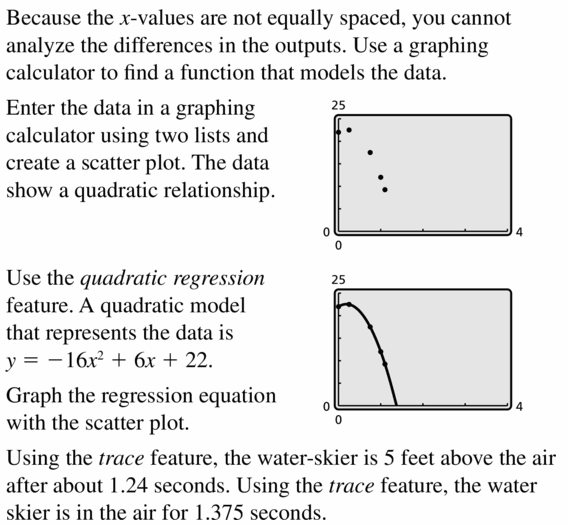
Question 36.
HOW DO YOU SEE IT? Use the graph to determine whether the average rate of change over each interval is positive, negative, or zero.
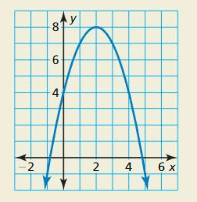
a. 0 ≤ x ≤ 2
b. 2 ≤ x ≤ 5
c. 2 ≤ x ≤ 4
d. 0 ≤ x ≤ 4
Answer:
Question 37.
REPEATED REASONING The table shows the number of tiles in each figure. Verify that the data show a quadratic relationship. Predict the number of tiles in the 12th figure.
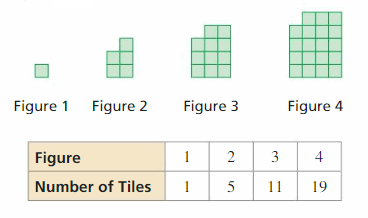
Answer:
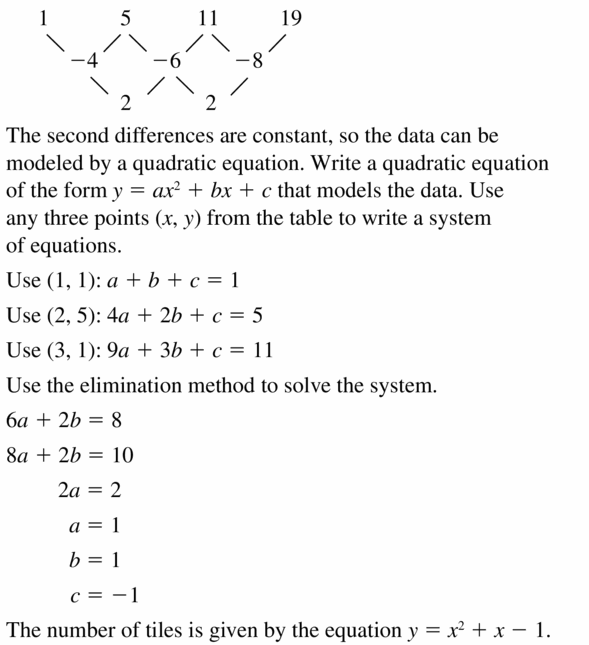

Maintaining Mathematical Proficiency
Factor the trinomial. (Skills Review Handbook)
Question 38.
x2 + 4x + 3
Answer:
Question 39.
x2 – 3x + 2
Answer:
![]()
Question 40.
3x2 – 15x + 12
Answer:
Question 41.
5x2 + 5x – 30
Answer:
![]()
Quadratic Functions Performance Task: Accident Reconstruction
2.3–2.4 What Did You Learn?
Core Vocabulary
focus, p. 68
directrix, p. 68
Core Concepts
Section 2.3
Standard Equations of a Parabola with Vertex at the Origin, p. 69
Standard Equations of a Parabola with Vertex at (h, k), p. 70
Section 2.4
Writing Quadratic Equations, p. 76
Writing Quadratic Equations to Model Data, p. 78
Mathematical Practices
Question 1.
Explain the solution pathway you used to solve Exercise 47 on page 73.
Question 2.
Explain how you used definitions to derive the equation in Exercise 53 on page 74.
Question 3.
Explain the shortcut you found to write the equation in Exercise 25 on page 81.
Question 4.
Describe how you were able to construct a viable argument in Exercise 28 on page 81.
Performance Task
Accident Reconstruction
Was the driver of a car speeding when the brakes were applied? What do skid marks at the scene of an accident reveal about the moments before the collision?

To explore the answers to these questions and more, go to BigIdeasMath.com.
Quadratic Functions Chapter Review
Describe the transformation of f(x) = x2 represented by g. Then graph each function.
Question 1.
g(x) = (x + 4)2
Question 2.
g(x) = (x – 7)2 + 2
Question 3.
g(x) = -3(x + 2)2 – 1
Question 4.
Let the graph of g be a horizontal shrink by a factor of \(\frac{2}{3}\), followed by a translation 5 units left and 2 units down of the graph of f(x) = x2.
Question 5.
Let the graph of g be a translation 2 units left and 3 units up, followed by a reflection in the y-axis of the graph of f(x) = x2 – 2x.
Graph the function. Label the vertex and axis of symmetry. Find the minimum or maximum value of f. Describe where the function is increasing and decreasing.
Question 6.
f(x) = 3(x – 1)2 – 4
Question 7.
g(x) = -2x2 + 16x + 3
Question 8.
h(x) = (x – 3)(x + 7)
Question 9.
You can make a solar hot-dog cooker by shaping foil-lined cardboard into a parabolic trough and passing a wire through the focus of each end piece. For the trough shown, how far from the bottom should the wire be placed?
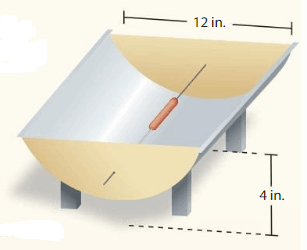
Question 10.
Graph the equation 36y = x2. Identify the focus, directrix, and axis of symmetry.
Write an equation of the parabola with the given characteristics.
Question 11.
vertex: (0, 0)
directrix: x = 2
Question 12.
focus: (2, 2)
vertex: (2, 6)
Write an equation for the parabola with the given characteristics.
Question 13.
passes through (1, 12) and has vertex (10, -4)
Question 14.
passes through (4, 3) and has x-intercepts of -1 and 5
Question 15.
passes through (-2, 7), (1, 10), and (2, 27)
Question 16.
The table shows the heights y of a dropped object after x seconds. Verify that the data show a quadratic relationship. Write a function that models the data. How long is the object in the air?

Quadratic Functions Chapter Test
Question 1.
A parabola has an axis of symmetry y= 3 and passes through the point (2, 1). Find another point that lies on the graph of the parabola. Explain your reasoning.
Question 2.
Let the graph of g be a translation 2 units left and 1 unit down, followed by a reflection in the y-axis of the graph of f(x) = (2x + 1)2 – 4. Write a rule for g.
Question 3.
Identify the focus, directrix, and axis of symmetry of x = 2y2. Graph the equation.
Question 4.
Explain why a quadratic function models the data. Then use a linear system to find the model.

Write an equation of the parabola. Justify your answer.
Question 5.
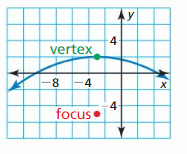
Question 6.
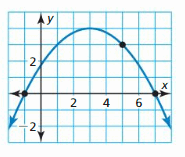
Question 7.
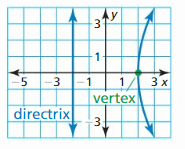
Question 8.
A surfboard shop sells 40 surfboards per month when it charges $500 per surfboard. Each time the shop decreases the price by $10, it sells 1 additional surfboard per month. How much should the shop charge per surfboard to maximize the amount of money earned? What is the maximum amount the shop can earn per month? Explain.
Question 9.
Graph f(x) = 8x2 – 4x+ 3. Label the vertex and axis of symmetry. Describe where the function is increasing and decreasing.
Question 10.
Sunfire is a machine with a parabolic cross section used to collect solar energy. The Sun's rays are reflected from the mirrors toward two boilers located at the focus of the parabola. The boilers produce steam that powers an alternator to produce electricity.
a. Write an equation that represents the cross section of the dish shown with its vertex at (0, 0).
b. What is the depth of Sunfire? Justify your answer.
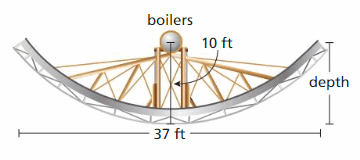
Question 11.
In 2011, the price of gold reached an all-time high. The table shows the prices (in dollars per troy ounce) of gold each year since 2006 (t = 0 represents 2006). Find a quadratic function that best models the data. Use the model to predict the price of gold in the year 2016.

Quadratic Functions Cumulative Assessment
Question 1.
You and your friend are throwing a football. The parabola shows the path of your friend's throw, where x is the horizontal distance (in feet) and y is the corresponding height (in feet). The path of your throw can be modeled by h(x) = −16x2 + 65x + 5. Choose the correct inequality symbol to indicate whose throw travels higher. Explain your reasoning.
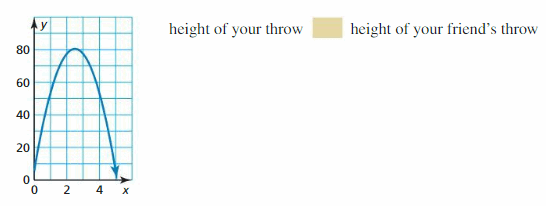
Question 2.
The function g(x) = \(\frac{1}{2}\)∣x − 4 ∣ + 4 is a combination of transformations of f(x) = | x|. Which combinations describe the transformation from the graph of f to the graph of g?
A. translation 4 units right and vertical shrink by a factor of \(\frac{1}{2}\), followed by a translation 4 units up
B. translation 4 units right and 4 units up, followed by a vertical shrink by a factor of \(\frac{1}{2}\)
C. vertical shrink by a factor of \(\frac{1}{2}\) , followed by a translation 4 units up and 4 units right
D. translation 4 units right and 8 units up, followed by a vertical shrink by a factor of \(\frac{1}{2}\)
Question 3.
Your school decides to sell tickets to a dance in the school cafeteria to raise money. There is no fee to use the cafeteria, but the DJ charges a fee of $750. The table shows the profits (in dollars) when x students attend the dance.
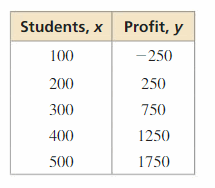
a. What is the cost of a ticket?
b. Your school expects 400 students to attend and finds another DJ who only charges $650. How much should your school charge per ticket to still make the same profit?
c. Your school decides to charge the amount in part (a) and use the less expensive DJ. How much more money will the school raise?
Question 4.
Order the following parabolas from widest to narrowest.
A. focus: (0, −3); directrix: y = 3
B. y = \(\frac{1}{16}\)x2 + 4
C. x = \(\frac{1}{8}\)y2
D. y = \(\frac{1}{4}\)(x − 2)2 + 3
Question 5.
Your friend claims that for g(x) = b, where b is a real number, there is a transformation in the graph that is impossible to notice. Is your friend correct? Explain your reasoning.
Question 6.
Let the graph of g represent a vertical stretch and a reflection in the x-axis, followed by a translation left and down of the graph of f(x) = x2. Use the tiles to write a rule for g.

Question 7.
Two balls are thrown in the air. The path of the first ball is represented in the graph. The second ball is released 1.5 feet higher than the first ball and after 3 seconds reaches its maximum height 5 feet lower than the first ball.
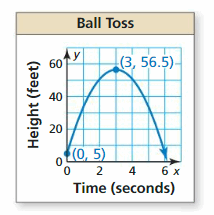
a. Write an equation for the path of the second ball.
b. Do the balls hit the ground at the same time? If so, how long are the balls in the air? If not, which ball hits the ground first? Explain your reasoning.
Question 8.
Let the graph of g be a translation 3 units right of the graph of f. The points (−1, 6), (3, 14), and (6, 41) lie on the graph of f. Which points lie on the graph of g?
A. (2, 6)
B. (2, 11)
C. (6, 14)
D. (6, 19)
E. (9, 41)
F. (9, 46)
Question 9.
Gym A charges $10 per month plus an initiation fee of $100. Gym B charges $30 per month, but due to a special promotion, is not currently charging an initiation fee.
a. Write an equation for each gym modeling the total cost y for a membership lasting x months.
b. When is it more economical for a person to choose Gym A over Gym B?
c. Gym A lowers its initiation fee to $25. Describe the transformation this change represents and how it affects your decision in part (b).
Source: https://bigideasmathanswer.com/big-ideas-math-algebra-2-answers-chapter-2/
0 Response to "Big Ideas Math 63 Oractice a Key Algebra 2 Blue"
Post a Comment